Jennifer Barclay's Blog, page 10
June 30, 2014
Artsy Rooms at the Pallas Athena

I was really in no fit state to be walking through the doors of a smart new boutique hotel.
My flight from Sydney a month ago arrived in Athens at 6 a.m. I’d spent the most gruelling section pinned into a middle seat for more hours than I’m usually awake, my back protesting so much that I couldn’t sleep and the only thing that kept me going was watching seven episodes in a row of House of Cards. Thank you, Kevin Spacey, I love you.
The Etihad flight connected at Abu Dhabi, where I waited impatiently amid the masses for a missing boarding pass, and guzzled the most essential glass of wine I have ever had. I had no idea how much 40 Emirati dirham was, but frankly I would have paid it if it was 40 US dollars.
Aegean welcomed a handful of passengers on board their section of the journey with sweets and smiles and let us all lie down across three seats each, so at least I was feeling vaguely human in the morning as I took the Metro to Monastiraki station and, turning my back on the Acropolis, walked down one of the liveliest streets in the city, Athinas, passing the buzzing central markets.
 A week earlier, I’d received a press release about the opening of the Grecotel Pallas Athena. What intrigued me was the design element. One of my favourite things about Athens, as you may know if you’ve been reading this blog for a while, is the street art. The Pallas Athena, a five-star boutique hotel owned by the leading luxury hotel group in Greece, has 63 rooms/suites individually decorated by street artists. I was catching a ferry back to Tilos so I couldn’t stay, but I could drop in for breakfast.
A week earlier, I’d received a press release about the opening of the Grecotel Pallas Athena. What intrigued me was the design element. One of my favourite things about Athens, as you may know if you’ve been reading this blog for a while, is the street art. The Pallas Athena, a five-star boutique hotel owned by the leading luxury hotel group in Greece, has 63 rooms/suites individually decorated by street artists. I was catching a ferry back to Tilos so I couldn’t stay, but I could drop in for breakfast.Feeling somewhat self-conscious, I was welcomed into a cool lobby and my backpack was whisked out of sight as I was invited to make myself comfortable in the dining room/lounge with its airy terrace on the first floor. Refreshed with grapefruit juice and mini-pastries, I learned about the hotel concept, then had a tour around a few of the rooms.
 The hotel opened in January 2014 as the newest boutique art hotel in central Athens, and has both chic art suites and whimsical graffiti guestrooms, featuring such artists as ‘b’ and ‘Dreyk the Pirate’. All the rooms were bright and uncluttered and comfy-looking. For single travellers or couples, they're stylish, playful and relaxing. For families, the spacious interconnecting rooms would be brilliant fun. There was even an octopus...
The hotel opened in January 2014 as the newest boutique art hotel in central Athens, and has both chic art suites and whimsical graffiti guestrooms, featuring such artists as ‘b’ and ‘Dreyk the Pirate’. All the rooms were bright and uncluttered and comfy-looking. For single travellers or couples, they're stylish, playful and relaxing. For families, the spacious interconnecting rooms would be brilliant fun. There was even an octopus...
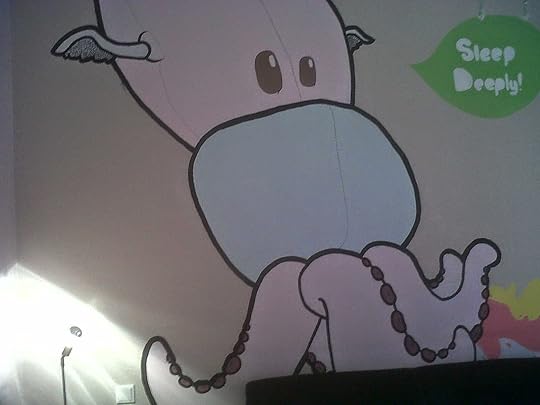

I felt I wouldn’t be doing a serious job of checking out the hotel if I didn’t sample the Eau de Grèce luxury bathroom products by Agreco Farms in Crete, where the hotel group originates.

 A body sculpture gel to ‘refine your silhouette, giving a more toned and firm appearance’, felt like just what I needed, after twenty-four hours of stuffing my face with airline food. Though first I’d need a bath.
A body sculpture gel to ‘refine your silhouette, giving a more toned and firm appearance’, felt like just what I needed, after twenty-four hours of stuffing my face with airline food. Though first I’d need a bath.Thanks to the Grecotel Pallas Athena for a delightful welcome. I should add that the hotel group was a leader in environmentally-friendly practice as early as 1991, which is a big plus point for me. And, checking out their website today, I see they still have some great room deals available. Well worth checking out for a city break, or if you're passing through to the islands... The Daskalantonakis Group also has super-plush places in Crete, Mykonos, Kos, Rhodes, Attica, the Peloponnese and Halkidiki.
Published on June 30, 2014 06:45
June 12, 2014
The Best Things in Life
A couple of days ago, I took my friend Ali to the ferry - she'd been staying with me for a holiday - and went into Remezzo bar on the quay to buy a couple of frappe coffees for us, when I realised I didn’t have any change. I sheepishly handed Popi behind the counter a fifty and apologised for not having any small notes, psila.
‘Na’seh kala kai na echeis panta hondra,’ she replied. May you be well, and always have large notes.
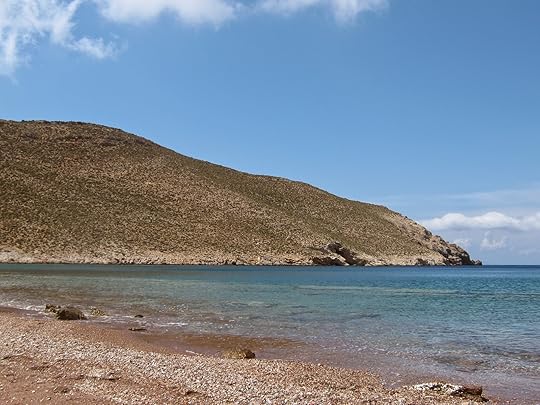
Last year, my freelance contract as commissioning editor came to an end, reducing my income in a stroke by about two thirds. I was overdue for a change of scene, but for someone who’s always cautious about money, I won’t lie – it was scary.
While continuing to work as a freelance editor and writer, I decided to use the opportunity to set up on my own as a literary agent. Having worked as an agent before, I know it can pay in the long run – but ‘in the long run’ are key words, since it’s all commission based on sales, and there are vast amounts of work involved in setting up new contacts alone. Keeping the faith that I’m doing the right thing has been hard. As if that weren't tough enough, I’ve also started trying to write a new book. And more recently I’ve been helping out at the Tilos Park information office – which pays very little, if anything at all.
And yet, I've never been happier. And since I returned to Tilos after my travels in April and May, which a friend nicely called 'island-hopping' (Rhodes-England-Australia), I've been appreciating the little things about life here that I love. Beyond the simple pleasure of being welcomed back by practically everyone I see, this week has been full of special moments. The more I get to know people on the island, the more I speak of the language, the richer life here becomes.
Michaelia looks after the ancient chapel just below my window and often stops on her way past for a chat. She’ll soon be living up at the monastery of Panteleimon for a month, she said, to help with preparations for the festival. On Friday afternoon she was on her way back from the church service on the eve of Psychosavvato, ‘Saturday of Souls’, one of three services to commemorate the dead, the previous being at the start of Lent, Apokreo. She told me to go inside and get a plate, so she could give us some kollyva, the Greek Orthodox memorial food made with sesame, sultanas, almonds and wheat berries.
That evening, Ali and I went to Sofia’s kafeneion for a drink, which turned into several thanks to the generosity of Nikos, who told Sofia so quickly to bring us beers that she’d already opened them before we could protest. He regaled us with stories of his cooking. When we’d first arrived, the kafeneion was quiet, but soon there were six men gathered around a card table, four playing and two watching. Sofia sighed and said ‘I watch but I don’t understand,’ and joined us at our table instead, telling us about the cattle she and her husband used to keep. Although people rarely milk the goats here on Tilos, she uses their own goats’ milk to make rizogalo, rice pudding, which she’d be cooking the next day. Ali, a very generous guest, went to pick some up for us.
On Saturday, arriving a little early at dance class in Livadia, I chatted with a friend called Seva – one of several Sevas on the island. She asked me where I live in Megalo Horio, and said she used to live there when she was seven. She was born in Mikro Horio, around the time when everyone started abandoning the village; when the junior school closed down in the 1960s, they had to move to Megalo Horio where the other school was. ‘They were difficult years, those,’ she said. ‘People were leaving, going to Australia and America. Boys started work early in those days, but there was no work on Tilos. So when we all finished school, my parents took us to live on Rhodes.’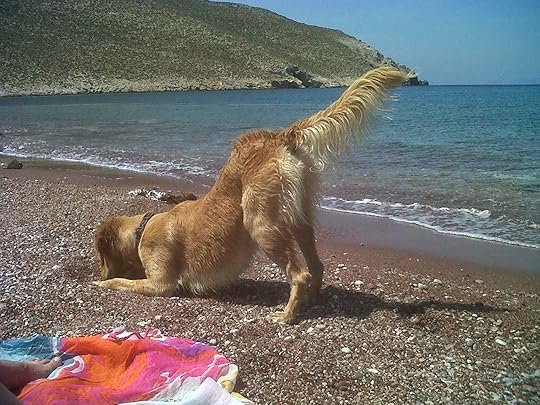
After a week of changeable weather, cool with clouds, the weather turned hot and sunny on Sunday, and Ali and I walked to Skafi beach through the green valley and spent hours in and out of the water while Lisa chased ants. In the evening, we ate once again at Kali Kardia (‘the Good Heart’), which was lively with the usual suspects from the village. We ate shrimp saganaki – shrimp in a spicy tomato sauce with feta – and souvlakia with cold white wine.
Tuesday evening after Ali left, returning home after superb kalamari and relaxing conversation at Omonia with my friend Anna, the moon was already bright over Megalo Horio. The only sounds as I walked home were the sheep, sheep’s bells, and Scops owls.
In the morning, awake early, I walked Lisa to Eristos and saw hazy sunlight pouring over the top of Amali mountain, still grey in shadow, and the dew gleaming in the tamarisk trees; while to the right, the orange and flesh-coloured cliffs already in full sunlight reflected their colours in the still water. We had the whole stretch of beach to ourselves. Along the road there and back, there were bees in the trees – the acacia and terebinth.
Lisa always stops outside Michalis’ house and wags her tail hopefully until he goes inside to get her a treat. But yesterday when I was walking alone down the seafront in Livadia, I heard ‘Ela Jenni!’ I turned around and saw Michali at a friend’s table, proffering a forkful of something, which I took and ate. Mmm, delicious. ‘Fish roe?’ I asked. ‘Yes, tuna eggs.’ Then he offered me a shot glass of raki to wash it down. ‘Make a wish,’ said his friend. When I set out from the village in the afternoon to walk Lisa, old Polixeni with her black clothes and her walking stick shouted across the street, ‘Are you not talking to me? When I love you and respect you…’ I greeted her and she swiftly crossed the street and gently hit me with her stick.
When I set out from the village in the afternoon to walk Lisa, old Polixeni with her black clothes and her walking stick shouted across the street, ‘Are you not talking to me? When I love you and respect you…’ I greeted her and she swiftly crossed the street and gently hit me with her stick.
I slowed down as I drove across the island from Megalo Horio to Livadia this morning, passing the abandoned village of Mikro Horio, and as I noticed the purple thyme flowers and pink oleander along the road, I thought again about Popi’s lovely expression about the large notes. That would be nice too, but thankfully life in Tilos is about much more than that. Some visitors to the Tilos Park office asked if living here was sometimes boring. Never.
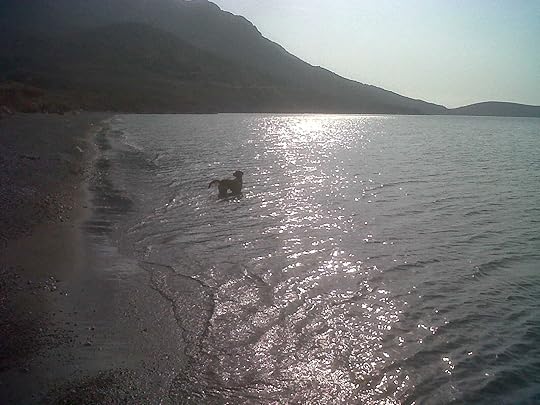
‘Na’seh kala kai na echeis panta hondra,’ she replied. May you be well, and always have large notes.

Last year, my freelance contract as commissioning editor came to an end, reducing my income in a stroke by about two thirds. I was overdue for a change of scene, but for someone who’s always cautious about money, I won’t lie – it was scary.
While continuing to work as a freelance editor and writer, I decided to use the opportunity to set up on my own as a literary agent. Having worked as an agent before, I know it can pay in the long run – but ‘in the long run’ are key words, since it’s all commission based on sales, and there are vast amounts of work involved in setting up new contacts alone. Keeping the faith that I’m doing the right thing has been hard. As if that weren't tough enough, I’ve also started trying to write a new book. And more recently I’ve been helping out at the Tilos Park information office – which pays very little, if anything at all.
And yet, I've never been happier. And since I returned to Tilos after my travels in April and May, which a friend nicely called 'island-hopping' (Rhodes-England-Australia), I've been appreciating the little things about life here that I love. Beyond the simple pleasure of being welcomed back by practically everyone I see, this week has been full of special moments. The more I get to know people on the island, the more I speak of the language, the richer life here becomes.
Michaelia looks after the ancient chapel just below my window and often stops on her way past for a chat. She’ll soon be living up at the monastery of Panteleimon for a month, she said, to help with preparations for the festival. On Friday afternoon she was on her way back from the church service on the eve of Psychosavvato, ‘Saturday of Souls’, one of three services to commemorate the dead, the previous being at the start of Lent, Apokreo. She told me to go inside and get a plate, so she could give us some kollyva, the Greek Orthodox memorial food made with sesame, sultanas, almonds and wheat berries.
That evening, Ali and I went to Sofia’s kafeneion for a drink, which turned into several thanks to the generosity of Nikos, who told Sofia so quickly to bring us beers that she’d already opened them before we could protest. He regaled us with stories of his cooking. When we’d first arrived, the kafeneion was quiet, but soon there were six men gathered around a card table, four playing and two watching. Sofia sighed and said ‘I watch but I don’t understand,’ and joined us at our table instead, telling us about the cattle she and her husband used to keep. Although people rarely milk the goats here on Tilos, she uses their own goats’ milk to make rizogalo, rice pudding, which she’d be cooking the next day. Ali, a very generous guest, went to pick some up for us.
On Saturday, arriving a little early at dance class in Livadia, I chatted with a friend called Seva – one of several Sevas on the island. She asked me where I live in Megalo Horio, and said she used to live there when she was seven. She was born in Mikro Horio, around the time when everyone started abandoning the village; when the junior school closed down in the 1960s, they had to move to Megalo Horio where the other school was. ‘They were difficult years, those,’ she said. ‘People were leaving, going to Australia and America. Boys started work early in those days, but there was no work on Tilos. So when we all finished school, my parents took us to live on Rhodes.’

After a week of changeable weather, cool with clouds, the weather turned hot and sunny on Sunday, and Ali and I walked to Skafi beach through the green valley and spent hours in and out of the water while Lisa chased ants. In the evening, we ate once again at Kali Kardia (‘the Good Heart’), which was lively with the usual suspects from the village. We ate shrimp saganaki – shrimp in a spicy tomato sauce with feta – and souvlakia with cold white wine.
Tuesday evening after Ali left, returning home after superb kalamari and relaxing conversation at Omonia with my friend Anna, the moon was already bright over Megalo Horio. The only sounds as I walked home were the sheep, sheep’s bells, and Scops owls.
In the morning, awake early, I walked Lisa to Eristos and saw hazy sunlight pouring over the top of Amali mountain, still grey in shadow, and the dew gleaming in the tamarisk trees; while to the right, the orange and flesh-coloured cliffs already in full sunlight reflected their colours in the still water. We had the whole stretch of beach to ourselves. Along the road there and back, there were bees in the trees – the acacia and terebinth.
Lisa always stops outside Michalis’ house and wags her tail hopefully until he goes inside to get her a treat. But yesterday when I was walking alone down the seafront in Livadia, I heard ‘Ela Jenni!’ I turned around and saw Michali at a friend’s table, proffering a forkful of something, which I took and ate. Mmm, delicious. ‘Fish roe?’ I asked. ‘Yes, tuna eggs.’ Then he offered me a shot glass of raki to wash it down. ‘Make a wish,’ said his friend.
 When I set out from the village in the afternoon to walk Lisa, old Polixeni with her black clothes and her walking stick shouted across the street, ‘Are you not talking to me? When I love you and respect you…’ I greeted her and she swiftly crossed the street and gently hit me with her stick.
When I set out from the village in the afternoon to walk Lisa, old Polixeni with her black clothes and her walking stick shouted across the street, ‘Are you not talking to me? When I love you and respect you…’ I greeted her and she swiftly crossed the street and gently hit me with her stick. I slowed down as I drove across the island from Megalo Horio to Livadia this morning, passing the abandoned village of Mikro Horio, and as I noticed the purple thyme flowers and pink oleander along the road, I thought again about Popi’s lovely expression about the large notes. That would be nice too, but thankfully life in Tilos is about much more than that. Some visitors to the Tilos Park office asked if living here was sometimes boring. Never.

Published on June 12, 2014 07:46
May 21, 2014
Dog Days, Retirement, Food and Island Life on Tenerife - an interview with John Searancke
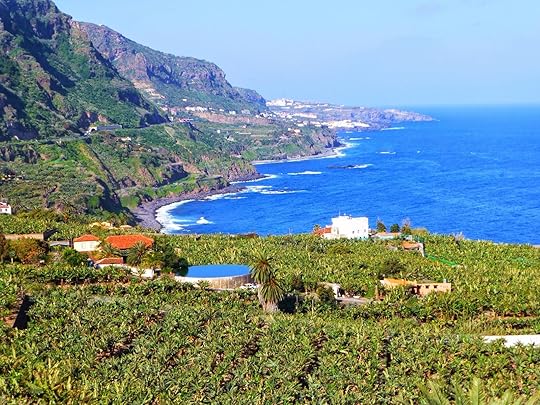
We're taking a virtual trip to another sunny island, with another dog, dear readers... A few years ago, John Searancke and his wife Sally retired to Tenerife, one of the Canary Islands, taking Freddie the dog with them – hence the title of his first book, DOG DAYS IN THE FORTUNATE ISLANDS. John and Sally had met in Lancashire, where they ran a business together for ten years.
John, how did you choose ‘The Fortunate Islands’ (an old name for the Canary Islands) as your new home?
The decision was mostly made for us in advance, because we had bought a holiday apartment years before we moved over there permanently. We had chosen the quieter, greener, northern part of the island, that less populated by mass tourism. The pressure of our business meant that we took more and more short breaks over there, and we realised that we did not want or need to look further. Our valley is just perfect for us, and we fell in love with it.
What things do you love best about your island home?
Well, we love the climate. Here in the north, there is not the unremitting sunshine that the holidaymakers so enjoy in the south. Between us lies El Teide, a dormant volcano, and the highest mountain in Spain. With its peak capped by winter snow, it creates a micro-climate here in the Orotava valley, giving sufficient cloud and rain to grow vines and bananas, so everywhere is green.
We love the people too. Perhaps because they are islanders, they have been so friendly and welcoming to us. Any tensions have been allayed as our grasp of the language has improved, such that we can now even dare to communicate with tortuous officialdom in government departments.

I was asked a couple of years ago, by Island Connections, the main English language newspaper for the Canary Islands, to become their restaurant reviewer (poshly titled “critico gastronomico” on my business card!) and this has led Sally and I to superb meals in out of the way restaurants that no casual visitor to the island would discover on their holiday. Wonderful seafood, in particular, is here in abundance: the combination of a sub-tropical island, the warm Atlantic ocean and the proximity of the coast of Africa less than 100 miles away, provides a rainbow of different coloured fish for our dinners.
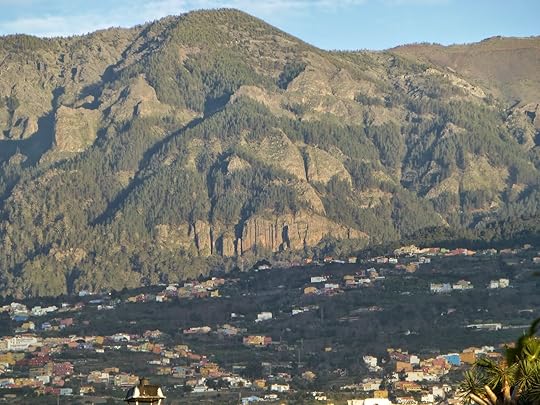 You say it’s a book about ‘hidden Tenerife’. Can you explain?
You say it’s a book about ‘hidden Tenerife’. Can you explain?We are hidden away from the mass tourism that the southern part of this island is so well known for by the majority of tourists in Europe who come here each year. Most never leave their hotel and beach complex in the south, and so therefore never discover the hidden north of the island.
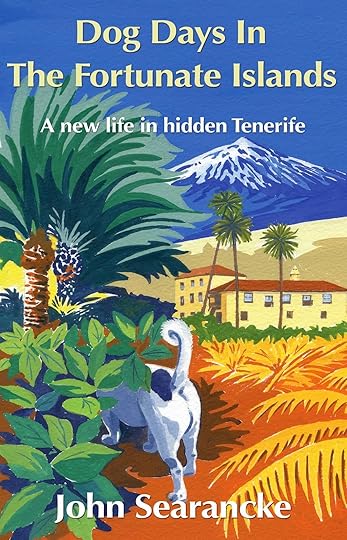
We live in the quaintly named San Fernando area, our apartment surrounded by old whitewashed villas with terracotta roofs, and larger fincas, the centres of banana cultivation for this valley. We think that we have world class views – and so did the explorer Humboldt when he came here over a century ago.
Should I really be revealing the secrets of our valley?
How did Freddie take to the move?
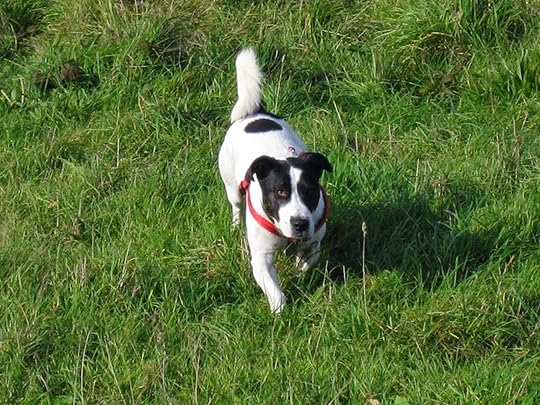 Freddie is a RSPCA rescue dog. Born in Lancashire, from eight weeks old he lived the first six years of his life in our Victorian family home with the seaside on one side and a large wood on the other. It must have been doggy heaven, and perfect for socialising.
Freddie is a RSPCA rescue dog. Born in Lancashire, from eight weeks old he lived the first six years of his life in our Victorian family home with the seaside on one side and a large wood on the other. It must have been doggy heaven, and perfect for socialising.To be, then, one cold and frosty morning, crated into a travel box, hoisted onto a JCB before being dumped into the hold of an aircraft, must have given him some pause for thought! But no, at the other end, where I was anxiously awaiting him, he took to Canary Island life like the proverbial duck to water. So much so that he unwittingly became almost the central character in my book, in which his exploits and friendships with new canine friends are fully detailed. He has an amazing social life, and we love him to bits. I have had wonderful dogs all my life, but, if I had to choose a favourite…
What did you do before you moved to Tenerife? Did moving there help you adjust to retirement?

Sally and I married a little later in life. For the last ten years of our time in England, we started and built up a commercial legal services company, introducing professionals in the north-west to new opportunities and supporting them as they took our products on board. The company grew too large by 2009 to handle without taking on extra staff and premises, so we sold out.
We have never been so busy since we retired. I know, I know, everyone that we have met has said it to us, but it is so true! We have had to learn a new language, integrate into the Spanish way of life, take on a role for the local newspaper, and a hundred other things, not least of which was to take a month travelling down from the English Midlands to this corner of our Atlantic island, in our 24 year old Mercedes 300 SL – the trip of a lifetime, and with the exploits included in my book!
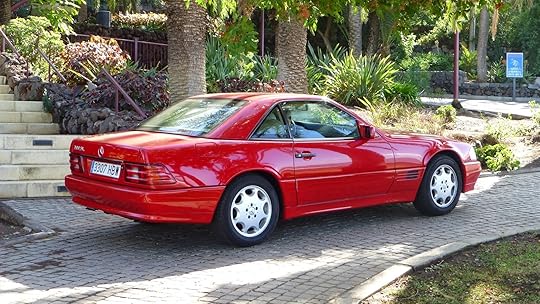
Is it a typically Spanish way of life?
It could be if we let it. But we are just so busy with the things that we do. I think that our young next-door neighbours (just the ideal Spanish couple) think that we are the reincarnation of whirling Dervishes. But sometimes, it is the perfect relaxation to put our activities behind us and soak back into the wonderful Spanish way of life, where everything is “mañana.”
How have you integrated into the local community and made new friends?
Well, it started with a Swede! A lovely lady became our professora de idiomas and also took us under her wing to meet others locally. We have centred our new life around the Spanish community and have perhaps unfortunately ignored the British ex-pats, but that is the way that it is – we came to integrate, not just to be seen as another couple of English holidaymakers. Now, we are not short of friends, and most days we take a morning coffee in one of the many cafés in the villages around our valley.
In the book, you take us to many of your favourite places to eat out in North Tenerife. Have you had any memorable meals lately? What is your favourite local dish?
I research the restaurants that I think will be suitable for entry into the newspaper. I very seldom include ones that are on a tourist trail or those that will be found by a casual visitor just by walking round the next corner whilst on their holiday. Often people will come to me and tell me of a favourite.
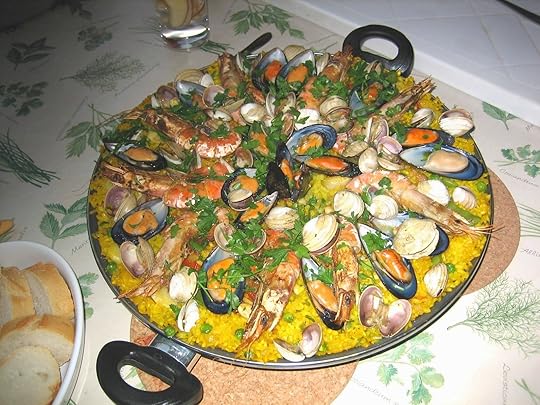
I am particularly taken by Guachinches, and make no apology for that despite the local furores created by traditional Spanish restaurants in the main towns. Guachinches – a completely new phenomenon to us, are small family run restaurants up in the hills, often in what can best be described as large garages. Spotlessly clean and ridiculously inexpensive, they are required by law to limit their choice of menu, and their wine too. The wine must be from their own harvest, and when it runs out, the Guachinche must close until the next harvest is ready to drink. I have had some of the best pork chops ever, anywhere in the world, in those Guachinches. Sublime!
What else should I single out? Well, paella is a hugely overblown dish in any tourist restaurant, and never worthy of the money. But, in a place that knows how to cook it properly, just so, it can reach extraordinary culinary heights. Look in my book for a perfect example at Los Silos.
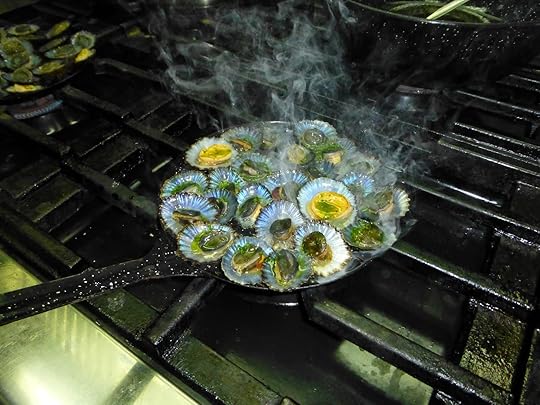
Oh, and lastly, I am going to highlight the humble limpet. Scorned, derided and ignored because of its chewy consistency, much like trying to eat your old school eraser, it again can reach for the stars when prepared by one who knows. A good fish restaurant will have one of those small white sacks of fresh limpets, alive, alive-oh, ready for you to savour. Either local, or flown in on the plane every day from Galicia.
Has life there changed you?
We just love it here. Our lives have changed immeasurably. It is warm every day of the year, and the tourist beaches are busy. It rains, of course it does, but mostly in showers, soon passed over. The food is superb, the people friendly, the service outstanding, and we have no need for central heating. All those years ago, when we bought our apartment, we really did make the right choice. All three of us would agree with that!
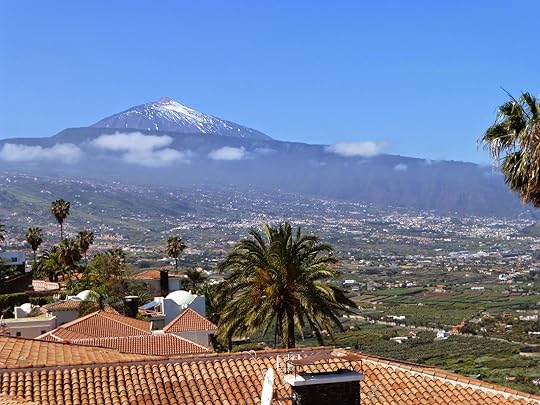
You can find out more (and buy his delightful book!) on John’s website, www.johnsearancke.com.
Published on May 21, 2014 18:36
May 11, 2014
A Tilos Shaggy Dog Tale
 In early spring, I was preparing to leave Tilos for two months, and Lisa, the lovely half-Labrador (ahem... dubbed by young Kyriakos the 'Tilos Devil') would need to be walked and cared for when I was away. Ideally I wanted her to stay in her own house, where she has a local fan club.
In early spring, I was preparing to leave Tilos for two months, and Lisa, the lovely half-Labrador (ahem... dubbed by young Kyriakos the 'Tilos Devil') would need to be walked and cared for when I was away. Ideally I wanted her to stay in her own house, where she has a local fan club.A friend introduced me to the magical world of house-sitting websites. You list the assignment (‘seeking dog-sitter for affectionate Labrador in quirky house on small Greek island’) and offer your home for free to someone who in return will care for your pet. Within 24 hours of the listing going live, I had as many enthusiastic responses.
Some, I guessed, were basing their love of the Greek islands on a five-star honeymoon in Santorini and perhaps wouldn't be cut out for the rigours of Tilos out of season. But there were plenty of suitable-sounding applicants, and the very first people to write sounded perfect: experienced, adaptable, nature-lovers, looking for a peace and quiet... They were keen to have their next assignment settled, so we had a long chat on Skype, in which I told them about the challenges of living on a tiny, fairly remote island, but nothing seemed to faze them. We shook hands on the arrangement. I was thrilled to bits.
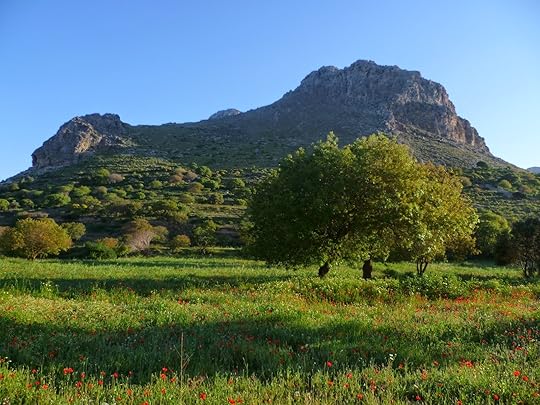
Three weeks later, they changed their minds.
Panicking, I scrambled through the list of previous applicants. One was still available. He seemed solid, reliable and had experience of living on a Greek island. As I gave him a Skype tour of the house, however, he got quieter and quieter. He didn’t seem too excited by the Byzantine chapel my office overlooks or the ruined castle visible from the terrace, or the view of mountains and sea; I think he might have been hoping for an infinity pool.
I wanted someone who would be happy: whatever the challenges of life on Tilos, it’s surely one of the most beautiful places in the world. When I told him I sensed it wasn’t quite right for him, his relief was palpable.
Back to the drawing board.
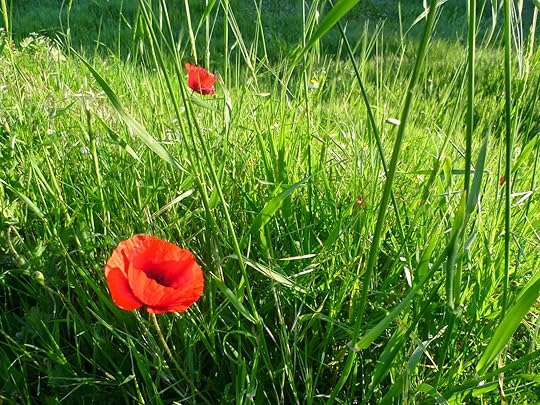
As various house-sitters said they were no longer available, it suddenly seemed a ludicrous idea to go away for two months and hope to find someone to look after my dog. I got so stressed that twice I managed to leave the key in the ignition of my car and let the battery go flat. Leaving Tilos was causing me a lot of grief.
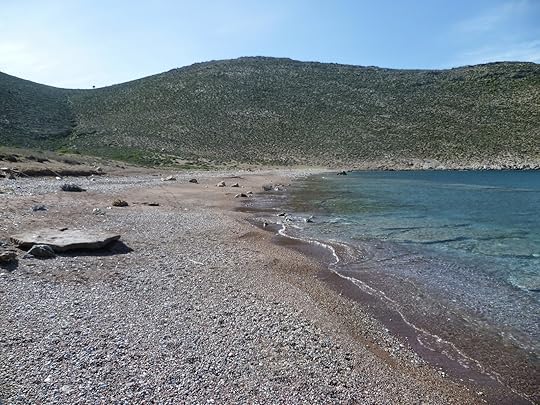
Then the first people came back and said they'd made a mistake by cancelling, and still wanted the assignment after all. There were extenuating circumstances, as they were living on an ashram and could only speak for an hour a day. Better the devil you know, perhaps? They seemed keen, and I had just three weeks before I flew out. We agreed again, and I relaxed and started packing. I caught up on the work I'd been missing during all this, and for good karma I booked them a fancy room for the stopover in Rhodes.
Over the next couple of weeks, emails kept arriving from them.
‘Which internet site should we use to book our flights?'
'Have you got a couple of mountain bikes?’ I’ve got one bike, I replied. ‘Could you get us another one?’
‘Have you got a juicer?’ Unfortunately not, I replied. ‘Could you see if anyone has one they're not using?'
And then, six days before I was due to leave:
‘I’ve been diagnosed with a serious health condition. Several members of my family have died from it. Do you think it’s a good idea to be on Tilos?’
A two-hour ferry journey from the nearest island with a hospital, and there isn’t a ferry every day...? I had to say, 'No, don't come.'
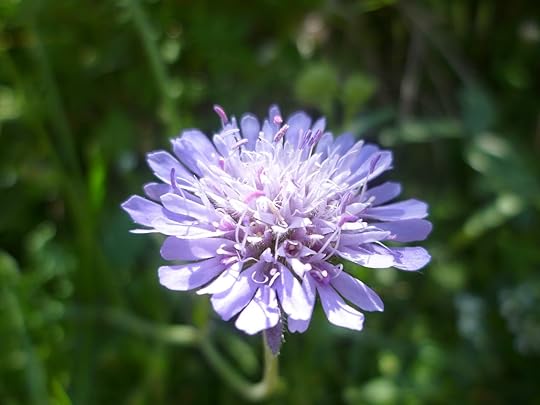
The clock was ticking. I had just one card up my sleeve. A French couple had emailed to say they were travelling in the region, and to let them know if my plans fell through. What were the chances of them still being available? I emailed them at once.
They were in Istanbul. They dropped everything, got on a bus the next day, travelled down through Turkey, slept a few hours, hopped on a ferry to Kos, and another ferry to Tilos, and arrived 24 hours later.
Within a few days, they’d settled right in, and none of us could quite believe our luck. I’d been rescued at the eleventh hour, and they were very happy with their temporary home. Lisa seemed increasingly delighted with the new arrangement. By the time they dropped me at the ferry, she barely acknowledged my presence.
Five weeks on? They've had a wonderful time exploring the island. And Lisa's had an amazing adventure with her new friends, as Guillaume's photos below show...
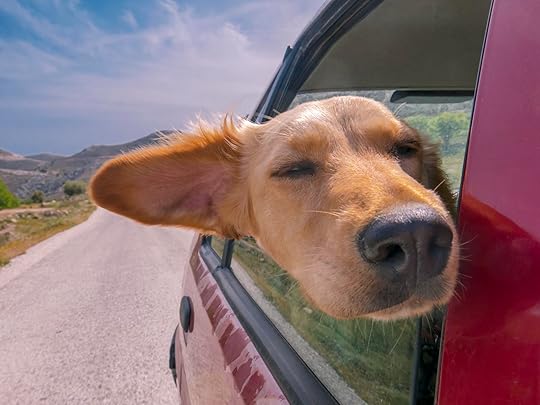
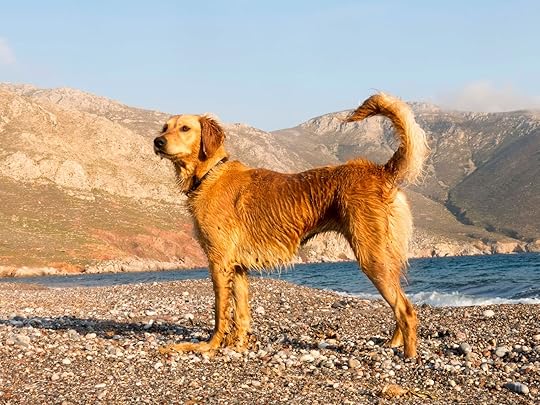
The final twist in the shaggy dog tale is best of all. They love Tilos so much that they are searching for another place so they can stay on for a few more months.
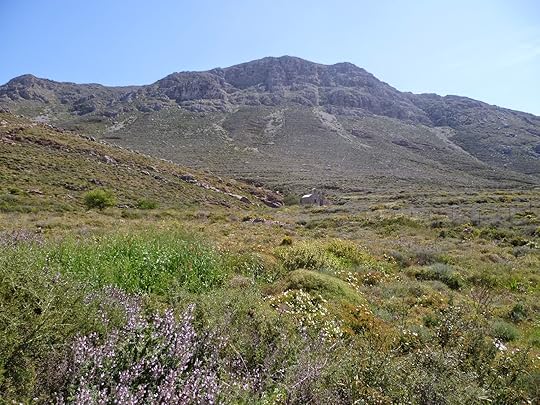
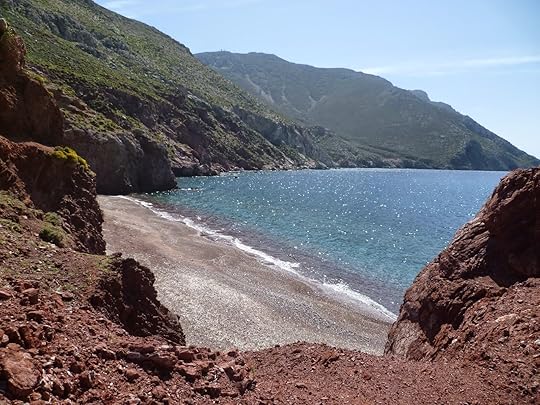
Published on May 11, 2014 03:23
April 25, 2014
Interview: Sibylle Meder talks about the film THE ISLAND BUS
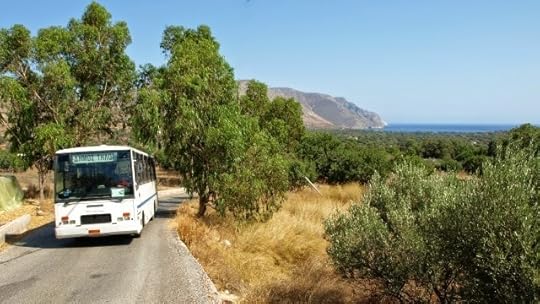
You’ve just completed the documentary film THE ISLAND BUS. How did living on Tilos inspire you to make this film?
Living in Greece - and maybe particularly on Tilos - cannot but inspire a filmmaker to make a film. There is something so theatrical and dramatic about everyday actions here.I was a passenger on this bus for a few times a week, going to Livadia either to do my shopping, go to the bank, or meet friends. And pretty much every time, something worth a story happened. By now, I have seen so many of them that I find them quite normal. But when for the first time the bus stopped in the middle of the road and the bus driver shouted something out of his window, and then a man appeared from his house and handed over a bag of fresh eggs, which was then passed around to some passenger who would take hold of it until we reached Livadia and the eggs were delivered to the shop - I couldn’t help but try to imagine this in a bus in, say, London, Sydney or Berlin.Of course, it has to do with the size of the population. So this might happen in a Scottish village. Yet, if you are on a bus in the Highlands - that’s at least what producer Lindsay Goodall who hails from Scotland tells me - it is unlikely that in the course of a 15 minute journey, you hear the life story of the old widow sitting next to you, the village barber recites a poem of a national Nobel Prize laureate and you share the vehicle with passengers from at least four other countries.
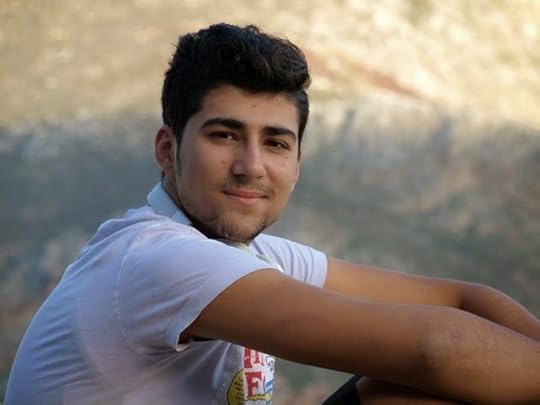 Learning more and more about the island, I realized what an extraordinarily mixed community this actually is. Saeed, a refugee boy from Afghanistan whose story of arrival we follow in THE ISLAND BUS, was first one of the refugees. When Lindsay and cinematographer George Geddes were on Tilos for our first trailer shoot, we heard him being called 'the boy who came'. A few weeks later it was 'Saeed'. And now he is a familiar personality on Tilos. Same goes for the other characters of the film: Marta, Sveta, Menelaos and the ubiquitous driver Pavlos all have their own story.This is what I find so beautiful about the place and the story of THE ISLAND BUS: it is human-sized. For every statistic, there is a name and a face.So it was the combination of a small island and village life with the particular fault line that Tilos and Greece in general resides on. This has been the melting pot of populations from East and West, North and South for millennia. That is just what the Eastern Mediterranean is. In a way, Tilos and what happens here is a microcosm of contemporary events in Europe and the world - and the island’s bus is a microcosm of life on Tilos.Another inspiration was that I wanted to find other filmmakers to collaborate with - but with a topic that would attract only those who are on the same page as me. When producer Lindsay Goodall of Beau Films and I first swapped ideas about the project, it was clear very soon that she enjoyed the quirkiness of Tilos as much as I do. Same goes for our German co-producers Anja and Mike Dehghan of High5Films and cinematographer George Geddes who spent his holiday being stuck in between tripod, feta tins and a bunch of schoolkids. They were persuaded to collaborate on THE ISLAND BUS by the style of the documentary - and the island itself. Like so often on Tilos, things just started to fall into place. Local musicians recorded the island songs for us, composers Tom Mangano and DJ Badre took my ideas about the soundtrack and turned them into something unique and exciting, sound designer Ali Murray and colorist John Sackey took time out from their busy schedules to apply their talents because the 'virtual holiday' on Tilos was so very different to some of the other jobs they are usually offered, German artist Viola Welker created our poster design - all these wonderful people were charmed by the island and our story about it.
Learning more and more about the island, I realized what an extraordinarily mixed community this actually is. Saeed, a refugee boy from Afghanistan whose story of arrival we follow in THE ISLAND BUS, was first one of the refugees. When Lindsay and cinematographer George Geddes were on Tilos for our first trailer shoot, we heard him being called 'the boy who came'. A few weeks later it was 'Saeed'. And now he is a familiar personality on Tilos. Same goes for the other characters of the film: Marta, Sveta, Menelaos and the ubiquitous driver Pavlos all have their own story.This is what I find so beautiful about the place and the story of THE ISLAND BUS: it is human-sized. For every statistic, there is a name and a face.So it was the combination of a small island and village life with the particular fault line that Tilos and Greece in general resides on. This has been the melting pot of populations from East and West, North and South for millennia. That is just what the Eastern Mediterranean is. In a way, Tilos and what happens here is a microcosm of contemporary events in Europe and the world - and the island’s bus is a microcosm of life on Tilos.Another inspiration was that I wanted to find other filmmakers to collaborate with - but with a topic that would attract only those who are on the same page as me. When producer Lindsay Goodall of Beau Films and I first swapped ideas about the project, it was clear very soon that she enjoyed the quirkiness of Tilos as much as I do. Same goes for our German co-producers Anja and Mike Dehghan of High5Films and cinematographer George Geddes who spent his holiday being stuck in between tripod, feta tins and a bunch of schoolkids. They were persuaded to collaborate on THE ISLAND BUS by the style of the documentary - and the island itself. Like so often on Tilos, things just started to fall into place. Local musicians recorded the island songs for us, composers Tom Mangano and DJ Badre took my ideas about the soundtrack and turned them into something unique and exciting, sound designer Ali Murray and colorist John Sackey took time out from their busy schedules to apply their talents because the 'virtual holiday' on Tilos was so very different to some of the other jobs they are usually offered, German artist Viola Welker created our poster design - all these wonderful people were charmed by the island and our story about it.How would you describe the film?
As a warm-hearted, sometimes tongue-in-cheek, sometimes gentle observational documentary. It is crafted to feel a bit like an independent fiction film, there are only few interview scenes, but mostly you get taken right into the action of life on a tiny Greek island. The film follows the bus and its journeys from morning till night and from Christmas until the height of the tourist season in summer, the festival of Agios Panteleimonas on 27 July. Along the way, you accompany Saeed as he is looking for a new home on Tilos and for people to call family. I would say it is a coming-of-age-road-movie-observational-documentary - with some of the most eclectic music mix you will hear in a while.
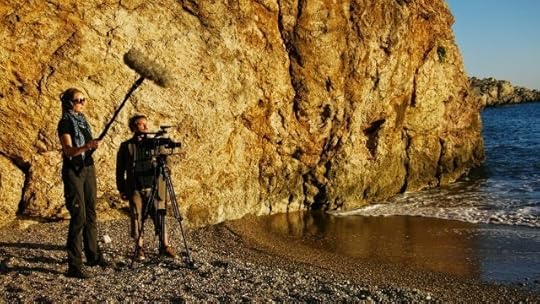
How would you describe yourself as a film maker?
I make the kind of films I would like to watch myself. No one had made a documentary about Tilos like this - so obviously I had to make one. Because that is what I wanted to watch. I have a lover’s approach to filmmaking: I fall deeply in love with the subject and then fight for it like only someone in that beautiful rage that is love can fight. That probably also means that I have a gentle approach to it. I like to laugh with my characters rather than about them. To figure it all out and as a collection of resources for myself but also maybe for others who are thinking along similar lines, I have recently started a blog called The Happy Filmmaker (http://sibyllemeder.net/the-happy-filmmaker). I am searching for those aspects of life that we all know that bring us to a deeper understanding - or a deeper appreciation - of something. I like to focus on the positive - even in those situations and things that are usually perceived as negative. I like to search for what gets us beyond that. A quest for human resilience, maybe.I have actually written a whole blog post (http://islandbus.wordpress.com/2013/07/03/i-fell-asleep-in-the-act-of-killing/) about what kind of film THE ISLAND BUS is and therefore what kind of filmmaker I am in response to watching THE ACT OF KILLING, one of the most celebrated documentaries of 2013 - which is a totally different film.
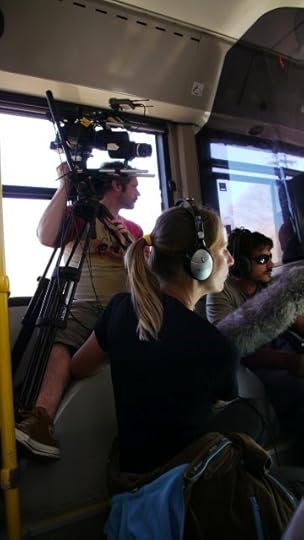 All that said, this is my first feature documentary. I am still starting out. Fortunately as directors, in most cases we don’t even get close to being recognized before nearing retirement age. So I am really still a newby. Who knows what kind of filmmaker I become when I grow up!
All that said, this is my first feature documentary. I am still starting out. Fortunately as directors, in most cases we don’t even get close to being recognized before nearing retirement age. So I am really still a newby. Who knows what kind of filmmaker I become when I grow up!How do you find living on Tilos?
Never a dull moment. I don’t know what people mean when they ask me whether I don’t get bored. Sometimes I crave a bit of boredom! If you want to, the social diary can take over your whole life. There are no such things as impersonal interactions - you just go to the shop to buy milk and are in the middle of a drama - or a party. But of course, the amount of events like theatre, cinema, nights out is still limited and the distractions can be reduced to what nature provides. So it can also be like an intensive work retreat if you organize your life that way: the lack of noise, advertising and general 'stuff' can leave you in that zone of intense focus on your work.With the added bonus that as a workaholic you don’t have to carve out some time to go to the countryside or to exercise. You just finish your work, step out the door and there it is: Nature. Can be squeezed in before dinner. That is a pretty healthy way of living - and working.At the same time, you gotta love challenges. As you well know, for example we don’t have an ATM since Christmas, so we need to go on a two hour ferry ride and stay overnight in a hotel - all this just to take out some cash. We only have a boat or two per week in winter that gets us to things like dentists, vets, supermarkets, an accountant or a shop where you can buy a computer cable. You might be told that something will happen 'tomorrow' and 7 years down the track, there is still no sign of it. So this makes you immensely resourceful.I used to laugh about it, then get annoyed about it, now I am back to laughing - and make sure I enjoy that fantastic view that unfolds just outside my window. I never tire of that: there is this beautiful deep blue bay and only the sound of the waves clasping at the shore just outside my house. When you see and hear and smell that, it is pretty hard being annoyed for too long.For all the complications, another upside is that some things can be really unbureaucratic and straightforward. When I approached the late mayor of Tilos, Tasos Aliferis, about support for THE ISLAND BUS, it took him about twenty seconds of thinking. 'You need an office with internet access? Why don't we just put a table for you into the KEP?', and so the local council supported the project in-kind. His successor, Maria Aliferi-Kamma, reacted in a similar way. Things aren't made more complicated than they need to be if there is a handy solution. At first, I had qualms about approaching some of the film's contributors, thinking they might be shy of the camera. Not so! As soon as I came forward, people wanted to help and enjoyed the project. Things started to happen that I hadn't thought possible when I first had the idea for the film, and because everyone knows how to be resourceful, maybe this was the best place to start a project like that.
What does the driver of the island bus think about the film?
Pavlos has always thought it was an excellent idea that I made THE ISLAND BUS. He wasn’t too fond of being interviewed, but was more than happy to have me filming what was going on in his little kingdom time after time. He was happy to share all of his daily routine and at first thought it amusing that I took such an interest. After a while we developed this collaboration where he would start co-directing. Just as much as I learned to know the bus timetable by heart, Pavlos started to make sure the radio was turned off when I wanted to record sound, drive slowly if he noticed we were filming out the window, initiate conversations with passengers and even stop by my office to tell me I should be on a specific trip for there would be so-and-so who I had wanted to film. He loved the idea that he would turn up every so often in the film, like a recurring theme. At some stage I realized that he was going to be somewhere in the background in almost every scene, a bit like Hitchcock who always made a surprise appearance in his own films. After I told him that, we called each other Hitchcock for about 6 months.Pavlos also appreciated Saeed becoming the main character of the film and he appreciated that I wanted to show the story of how this island community functions and absorbs someone new like Saeed into its network of people. I have shown scenes of the film and the trailers while we were still filming and Pavlos usually laughed hardest at those scenes where he has a fit of anger about inconsiderate customers. When I had a screening of the finished film for all the main characters last winter, Pavlos’s only complaint was that I had cut the scene where he tosses a bag of bread two stories up to Sofia at the kafenion in Megalo Chorio. Seeing that I had made him delay that action for about 45 seconds until I was rolling camera, I guess he had a point.
When can we see it?
THE ISLAND BUS will be part of the Krakow Film Market screenings (26-30 May). The film has also been invited to another documentary festival and there will be a festival premiere this year (I can’t give any more details at this point, but you can get timely updates about all screening events on THE ISLAND BUS blog (http://islandbus.wordpress.com) or our Facebook page (https://www.facebook.com/pages/The-Is...), and we are planning more screenings at festivals and a Greek premiere at the Goethe Institute Athens in summer 2014. Visitors to Tilos will get the chance to watch it in an open-air cinema set up for the occasion on the island this summer and autumn.
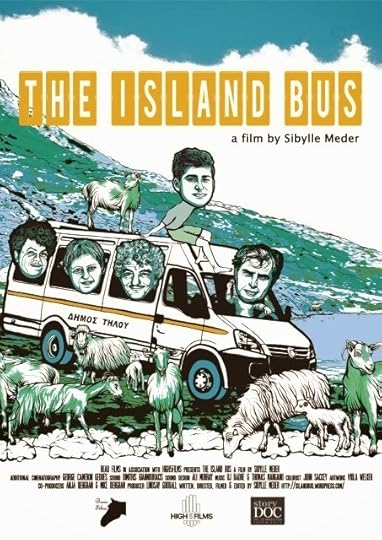
Published on April 25, 2014 19:08
March 22, 2014
Island Sunshine
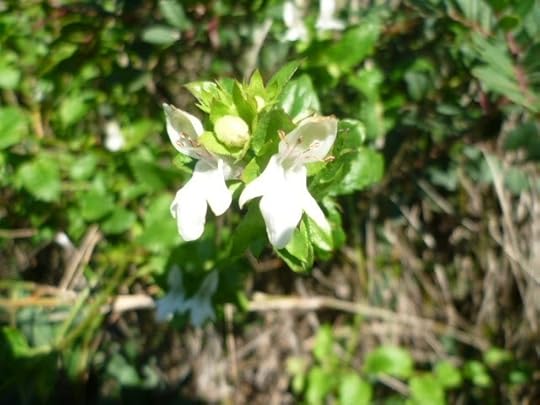
‘I can’t believe I was so stupid!’ I said to Eleftheria as she was weighing the vegetables, keying the prices into the till and loading my shopping into the bag the other evening. ‘I was going to drive to Ayios Andonis, and I’d left the key in the ignition, turned on. The battery was flat!’
‘Oh, I’ve done that myself,’ said Eleftheria, smiling.
‘I felt so stupid…’
Another lady from the village was standing by the counter. ‘Ara,’ she said, ‘so, are you saying Eleftheria’s stupid too?’ she said, smiling at the hole I’d dug for myself.
‘No, no!’ I protested, laughing, and Eleftheria said we made a good team, the Tilos hazoula and the foreign hazoula.
‘We’ll sort out your car tomorrow,’ she said. I went home and made dinner.
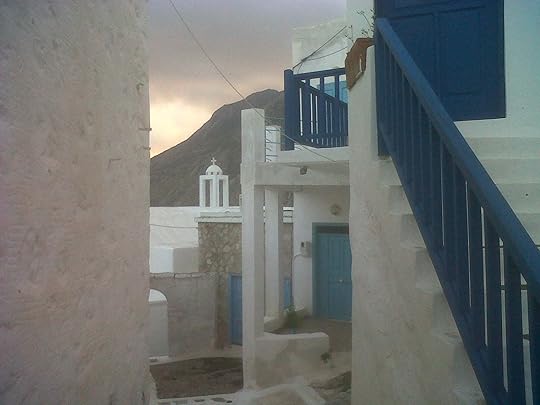
The weather was grey, rainy and windy for about ten days this month. A neighbour had a friend visiting from England during the stormy weather, which led to her boat to Rhodes being cancelled and her trip curtailed. With all that and still no functioning ATM on the island after three months (nice to know Alpha Bank care so much!), she must have wondered how we all survive.
But now, now spring is here, and it’s nice not to have to worry about unplugging the power and phone cables when I go out. Although the rain was needed, the sunshine has palpably changed everyone’s mood. There’s a feeling that summer is on its way: people are cleaning out their restaurants, rebuilding walls, laying new patios. And I’m loving the warmth and sunshine.
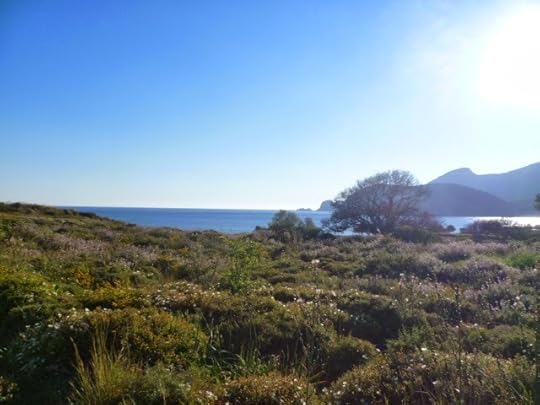
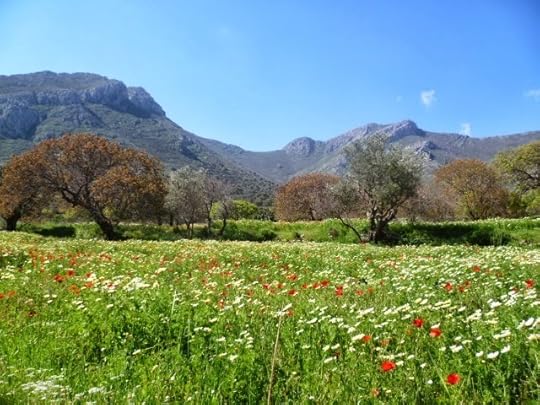
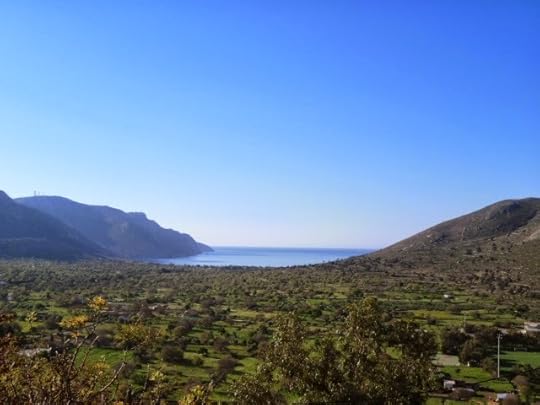 The island is green and lush. The springy greenery gives the mountainsides a softer aspect, and fields are bushy with huge daisies and oversized clover. One morning, I made the mistake of taking the old stony track from Kastro restaurant down towards the fields; the weeds are more than knee-high, and I ended up with shoes and jeans soaked with dew. There's also a breath-taking diversity of different flowers.
The island is green and lush. The springy greenery gives the mountainsides a softer aspect, and fields are bushy with huge daisies and oversized clover. One morning, I made the mistake of taking the old stony track from Kastro restaurant down towards the fields; the weeds are more than knee-high, and I ended up with shoes and jeans soaked with dew. There's also a breath-taking diversity of different flowers. 
 When I’m out and about with Lisa, people often ask if I’m going for a walk, a volta, but the other afternoon the deep blue skies brought on a burst of diminutives, with one lady asking if I was going for a voltoula, and Despina calling out, ‘Kali voltitsa!’ as she and her mother gathered horta in a meadow.
When I’m out and about with Lisa, people often ask if I’m going for a walk, a volta, but the other afternoon the deep blue skies brought on a burst of diminutives, with one lady asking if I was going for a voltoula, and Despina calling out, ‘Kali voltitsa!’ as she and her mother gathered horta in a meadow.I later walked towards Plaka in the peace of the early evening. The sound of my boots on the road was intrusive. I stopped and listened to the waves lapping the shore below. Lisa and I startled the partridges out of the undergrowth as we passed, and goats twisted their heads towards us, curious.
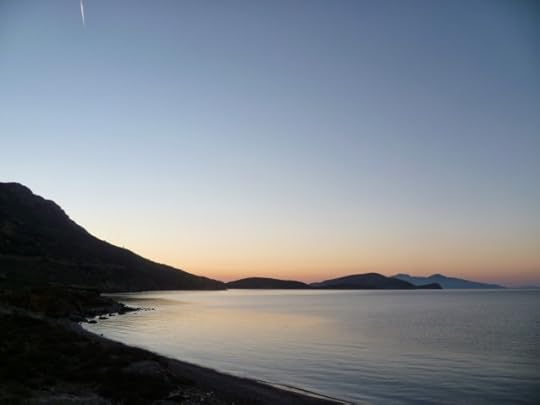
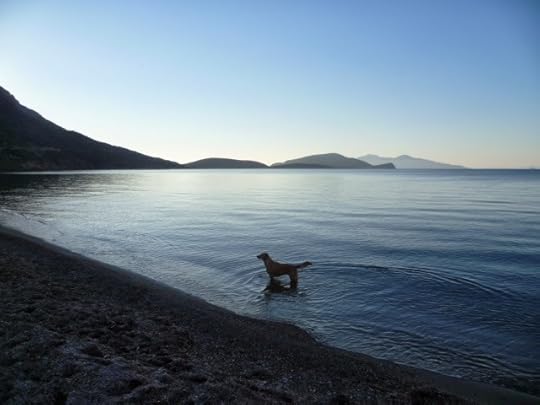
I was out walking early this week when I dropped my camera, and for some reason although the camera was fine, it deleted the stored photos. In fact it’s something of a relief, as I’m always hoarding photos, just as I hoard interesting bits of paper containing useful ideas for things I should do but never get around to. This month I did a spring cleaning of my office, and feel a lot better without all those bits of paper.
When I looked properly at the camera after I got home, it turned out the memory was empty except for a handful of photos which had somehow survived: they were of my lovely great-aunt Cath, sitting in my mum’s garden with the rest of the family, in the week before I moved to Tilos. Cath died this month at the age of 86. Her last holiday was last summer in Tilos.
There was also a funeral in the village this week. Later, I ran into two friends, chatting and looking tearful. They said they wanted to talk about good-humoured things, after being sad for a while, and I learned a lovely Greek expression:
‘Never a wedding without tears, or a funeral without laughter.’
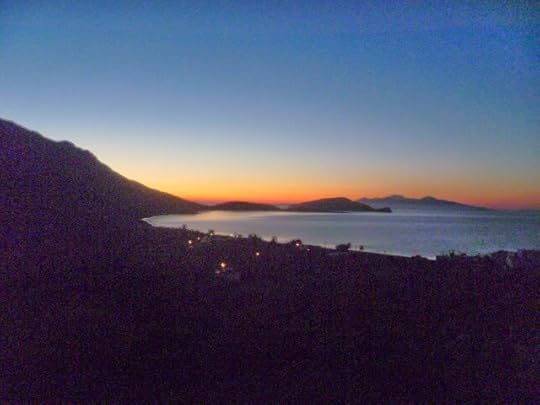
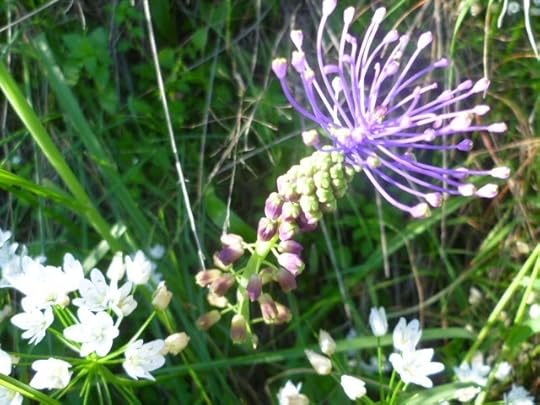
It sometimes appears that life is a bed of roses, or oversized daisies (which would probably make for a more comfortable bed, when you think about it). But even here… sometimes….
I’m walking this morning when my phone rings. ‘Kyria Barclay? Do you speak Greek? I’m calling from the hospital. It’s about the miscarriage surgery you had last March. Do you remember?’
I wonder if she later feels stupid for asking that. She continues.
‘The insurance company won’t cover it because…’ Her Greek becomes very fast and I don’t understand a word. I ask her to repeat it and she says it at the same speed. I make out something about how they would only cover it in conjunction with another insurance policy. ‘Do you have IKA?’ Of course I don’t have IKA – if I did, why would I need private insurance?
Europeans living in Greece have health care covered by their EHIC card. But annoyingly, because I earned money in more than one EU country the year before last, it got more complicated and I opted to take out health insurance.It’s taken the private insurance company, Ethniki, a year to decide they’re not covering the cost of my operation. Is it just a coincidence that last week I told Ethniki I wasn’t renewing my policy?
‘So,’ the woman continues, ‘you have to pay us.’ Then suddenly she gets aggressive, as if I’m to blame for this year-old unsettled account. ‘You have to pay amesa! Immediately! AMESA!’
I hang up and try to block out her voice as I head to the beach. The day is warming up. All I’m doing amesa is going for a swim.
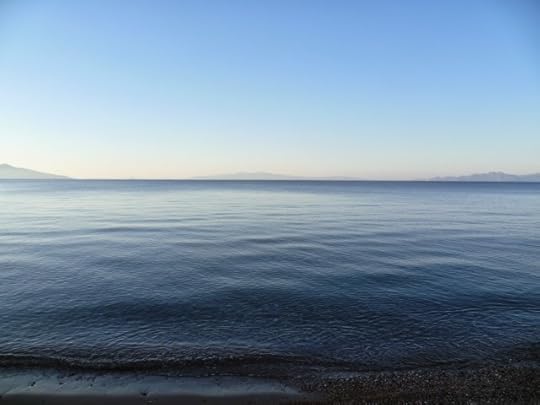
The sea at Ayios Andonis is perfectly calm and clear blue: out near the end of the promontory to the right of the bay, it’s like glass. I have a long swim up and down the beach under the windmill. Lisa tears up and down the sand, dribbling an old punctured football she found in a cave. On the way back, I stop to chat with a friend and he offers to get my car going; if I drive down to Livadia then, it will recharge the battery.
Like Lisa, I get excited about an excursion to Livadia – it’s good to say hello to folks we haven’t seen for a while. Everyone’s in a good mood; I get a friendly welcome at the post office where I go to send back the contracts for the Bulgarian edition of Falling in Honey; the other night, when I was excitedly signing them, I looked up the name of the publisher, and it turns out it means ‘sun’, appropriately enough. When I go to buy wine and vegetables from Sotiris, he is very enthusiastic about a new brand of milk he’s ordered. ‘Try it and tell me what you think!’
The sage bushes with their mauve flowers crowd the edges of the back road like giant purple heather. I can’t resist another swim, diving off the white pebbles into deep blue water, and swimming far out, the whole bay to myself.
Later, the sun is warm enough for a nap on the terrace.
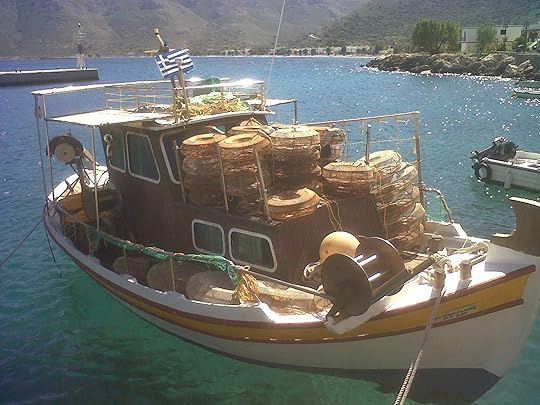
Back at home, I have some pleasant work to do: drafting answers to a Q&A about my life on Tilos for Islands magazine.
All month I’ve been busy writing guest blogs to spread the word about the US publication of Falling in Honey, and I’ve had some great support from bloggers (see links on the Falling in Honey page). I’ve also had some surprising messages from readers. Someone just wrote to say they’d been inspired to spend a month on Halki last year and will be going back for longer, while another person said he’d been inspired to pack up working next year and live a simpler life. Are we starting a movement, folks?! Opa! I like to think so!
The Octopus will be mostly away in April and May, having adventures and trying to put pen to paper from time to time. Enjoy your days, wherever you are.
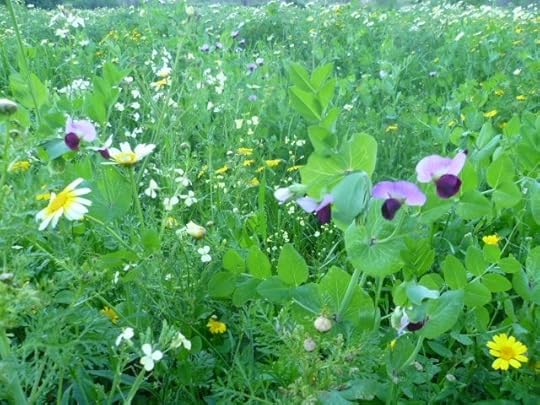
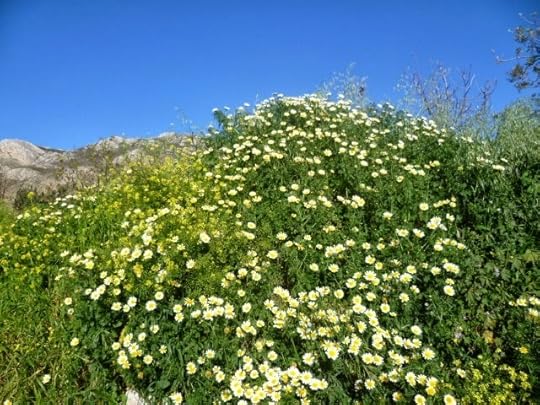

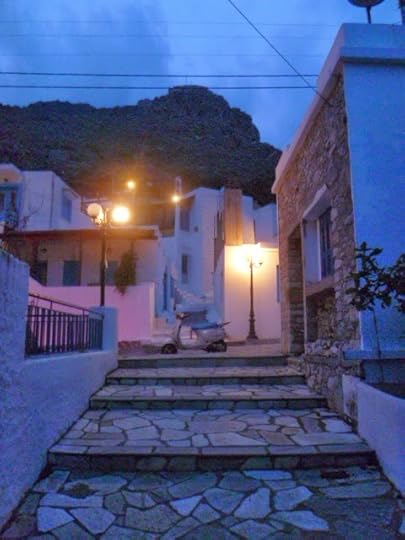
Published on March 22, 2014 09:03
March 2, 2014
Apokries, or Carnival
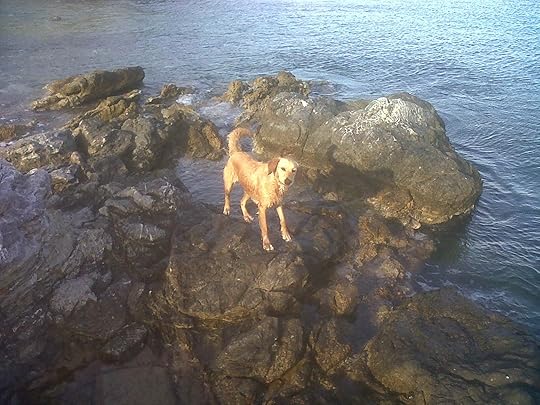 This dog which I profess to love woke me at four thirty one morning recently. I tossed and turned for an hour, then, defeated, decided it would be light soon anyway, so I might as well take her for her morning walk. I threw on the two closest jumpers and a pair of jeans and wellies, and set off.It was dark as we walked through the sleeping village. But when we reached the fields below, the songbirds and roosters were beginning to wake. And soon I could hear crashing waves down at Eristos, like a siren call… Lisa was pulling that way too, so we went. Walking at dawn is a nice way to wake up, I rationalised, while thinking about the cup of tea I’d make when I got back.It was just getting light as we neared the beach, where waves were smoothly rolling in and crashing with white foam on the sand. I looked up to the sky to the southeast, where thick fingers of cloud had started turning a vibrant red, growing deeper by the moment. As it glowed crimson, I looked down and the sea was red, as if flooded with blood. It was an almost scary spectacle. Five minutes later, it was gone. The clouds became orange and then paled.We turned back, taking the dirt track that passes En Plo, passing the chickens clucking around a field. Towards Profitis Ilias, the rocky hilltop was beginning to be touched by sunlight. Then the mountain seemed to receive the rising sun with full intensity; like switching on an electric fire, when the bar transforms from ash pale to bright orange-red. The top of the mountain was alive, while below and all around remained grey. No wonder the ancients came up with myths.Again, it lasted five minutes and then faded as the sun rose higher, and as we returned to the village, the sky was blue with puffy pink and purple clouds here and there, a benign and friendly sunshine beginning to spread about generally, and no hint of the mysteries we’d witnessed in that witching hour.
This dog which I profess to love woke me at four thirty one morning recently. I tossed and turned for an hour, then, defeated, decided it would be light soon anyway, so I might as well take her for her morning walk. I threw on the two closest jumpers and a pair of jeans and wellies, and set off.It was dark as we walked through the sleeping village. But when we reached the fields below, the songbirds and roosters were beginning to wake. And soon I could hear crashing waves down at Eristos, like a siren call… Lisa was pulling that way too, so we went. Walking at dawn is a nice way to wake up, I rationalised, while thinking about the cup of tea I’d make when I got back.It was just getting light as we neared the beach, where waves were smoothly rolling in and crashing with white foam on the sand. I looked up to the sky to the southeast, where thick fingers of cloud had started turning a vibrant red, growing deeper by the moment. As it glowed crimson, I looked down and the sea was red, as if flooded with blood. It was an almost scary spectacle. Five minutes later, it was gone. The clouds became orange and then paled.We turned back, taking the dirt track that passes En Plo, passing the chickens clucking around a field. Towards Profitis Ilias, the rocky hilltop was beginning to be touched by sunlight. Then the mountain seemed to receive the rising sun with full intensity; like switching on an electric fire, when the bar transforms from ash pale to bright orange-red. The top of the mountain was alive, while below and all around remained grey. No wonder the ancients came up with myths.Again, it lasted five minutes and then faded as the sun rose higher, and as we returned to the village, the sky was blue with puffy pink and purple clouds here and there, a benign and friendly sunshine beginning to spread about generally, and no hint of the mysteries we’d witnessed in that witching hour.
This time of year is known here as Apokries – the Greek version of Carnival. I first started being intrigued by the Apokries customs after a visit to a museum in Athens which displayed some of the freaky traditional costumes, some with animal fur covering their heads. In the Christian calendar, this time of year is all about the giving up of meat for Lent; apokries combining the words ‘away from’ and ‘meat’. Though clearly, it’s all wrapped up with ancient pagan customs too.There was a party at Bozi on Tsiknopempti, the day for gorging on all the meat you’re about to give up. We arrived when a group of children in fancy dress were dancing zumba. It was entertaining, but the end of the event, and we were left standing in the aftermath of a kids’ party: paper plates, streamers, and little people in fancy dress running around fighting with balloon swords, while tired parents and relatives wandered zombie-like in their wake.So, we asked anyone who’d listen: if Tsiknopempti is the day for feasting on sizzling barbecued meat before Lent, why are there another ten days before Kathari Deftera, Clean Monday? There are three stages, it turns out. The following week you can still eat animal products. We hustled a souvlaki from the grill. I’d gone there with Sibylle, our good friend from over at The Island Bus. She’d been over to the house to use the internet that afternoon. Recovering from being loved-up by Lisa, she went to make herself a cup of tea. I turned around to see water streaming out of the kettle, and I had to apologise. You see, I bought that kettle in a supermarket in Rhodes about a year ago. As soon as I got it home I found out that it leaked from the handle if you filled it with water for more than one mug. If I lived in Rhodes, of course, I’d have taken it straight back to the shop. But when you live in Tilos, and the choice is taking it back on the ferry next time you go, and in the meantime living without a kettle… Well, you just keep it. I think of it as an eco-friendly kettle, as if you boil more water than you need for one cup, you’re at risk of electrocution.A few days later, clearly she had forgiven me, as I was deliberating where to take Lisa for her afternoon walk when a message arrived from Sibylle suggesting we go to the Apokries festivities in Livadia. So that became my destination for the walk, and we arranged to meet there. The weather was cloudy, but hot when the sun peeked out; so, arriving early after our walk, Lisa and I went for a surreptitious dip in the sea. The festivities began with dances by the young children; then by women wearing brightly coloured flowers in their hair. Then what looked just like a maypole with a mask on top was carried out into the square, and a dance followed with twelve women weaving the ribbons around it. This Greek carnival custom is called the gaitanaki; the twelve ribbons relate to the months of the year, while the interweaving of the ribbons, or gaitania, symbolizes the circle of life and death, winter and spring. This springtime tradition, which occurs in May in northern Europe, happens in late February here when the flowers are already blooming.Then the dance floor was opened up to all, and we danced. One dance seemed to go on forever, and as the line of dancers got longer with more women joining in, it was a pleasure to see the sea, and the late afternoon sun on the hills; so few festivals take place in daytime, as in summer it’s too hot to dance in the midday sun.Just as dusk was closing in, there was a commotion and the maskers arrived: villagers dressed up with masks and scarves covering their faces, carrying kitchen tools to clatter and shake in our faces: comical but sinister. Someone had the face of an old man and wore a flowery house-dress. Another wore a pink evening gown and gloves, with slippers and a pink wig, carrying a ladle.
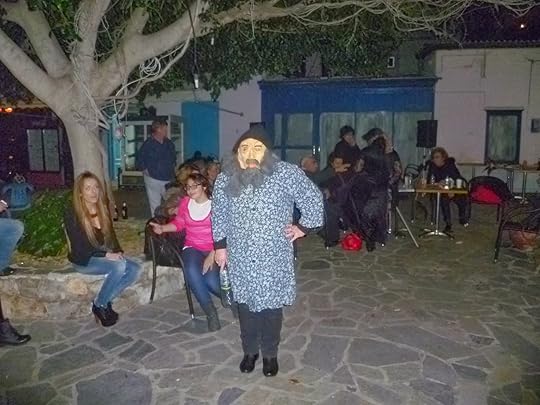 After watching for a while, I decided to do something I haven’t done for ages, and walk home across the island in the dark. Soon Lisa and I were leaving the noise of the music behind, and the lights of the bay; and there were just the high-pitched piped notes of the birds; the different smells as we passed different terrain; and, especially right in the middle of the island, utter calm, with layers of stars up above in the clear gap between the clouds. Only four times in the whole hour was the peace disrupted by a car driving by; the rest of the time, we had the island to ourselves. And when we reached the last quarter of the journey, I could hear the waves down at Eristos. The journey of a few days came full circle with that sound in the darkness.
After watching for a while, I decided to do something I haven’t done for ages, and walk home across the island in the dark. Soon Lisa and I were leaving the noise of the music behind, and the lights of the bay; and there were just the high-pitched piped notes of the birds; the different smells as we passed different terrain; and, especially right in the middle of the island, utter calm, with layers of stars up above in the clear gap between the clouds. Only four times in the whole hour was the peace disrupted by a car driving by; the rest of the time, we had the island to ourselves. And when we reached the last quarter of the journey, I could hear the waves down at Eristos. The journey of a few days came full circle with that sound in the darkness.
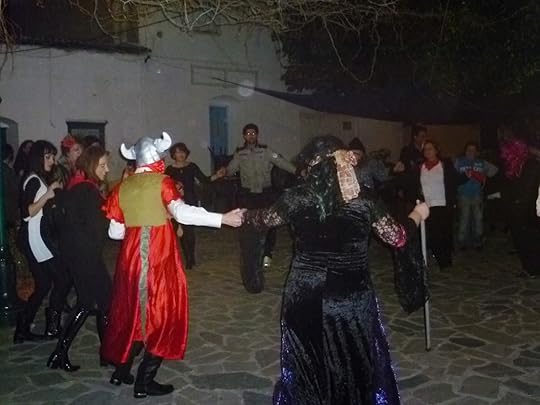
The big Apokries celebrations happened this weekend, with more partying and parades. But I’m observing my personal ritual of being borderline antisocial in order to recharge my batteries. Lisa and I have been walking and swimming, and I’ve been celebrating spring by marvelling at the mauve flowers on the sage bushes, the yellow spiny broom and the new, pale green leaves on the trees.As I started writing this, after an afternoon’s walk to Plaka, I realised on doing some online research that it was good that I had just cut myself a meze plate of graviera, as it is 2 March, tirofagis, the day for eating cheese. Tomorrow is Kathari Deftera, the start of fasting for Easter – which starts, of course, with a feast of seafood…
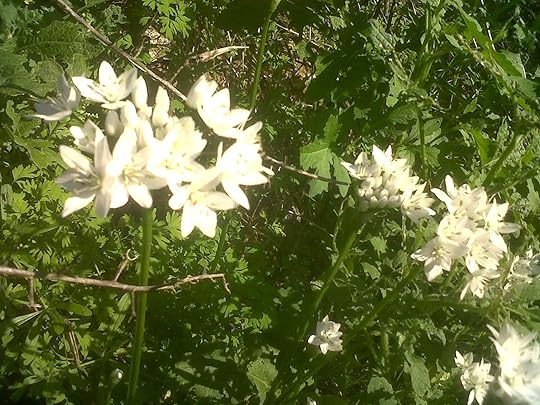
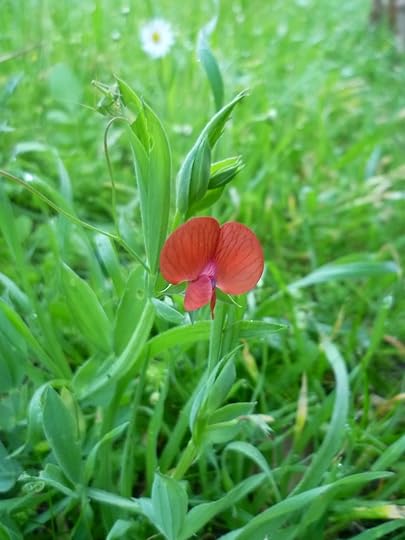
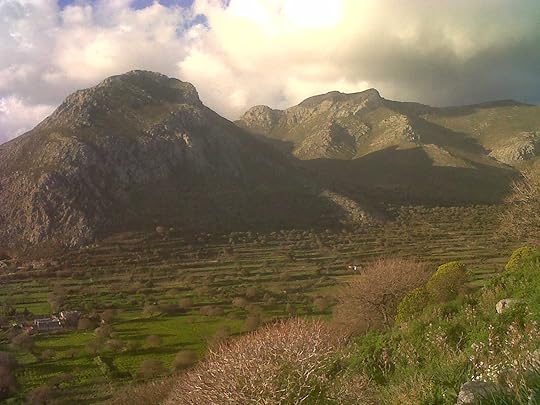
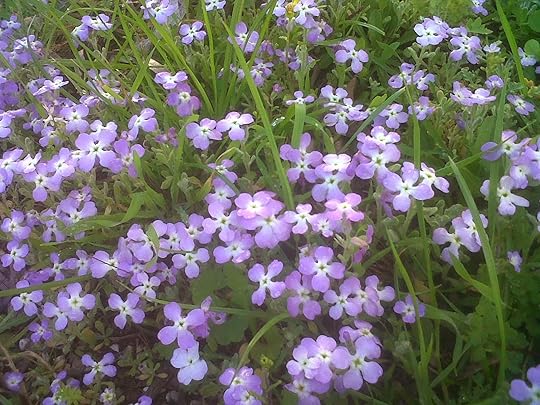
Published on March 02, 2014 13:06
February 13, 2014
Flowers for Valentine's Day
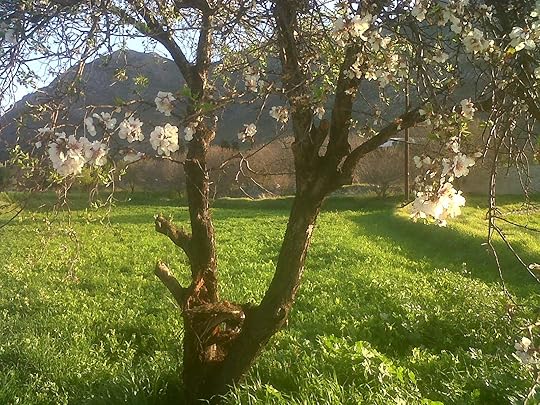
With apologies to readers who are paddling their way through a biblical flood or deep in an ice age, but we've just had an extraordinary taste of summer here in Tilos. For days, lizards have been sunning themselves on rocks, and plants were wilting on the balcony and had to be watered.
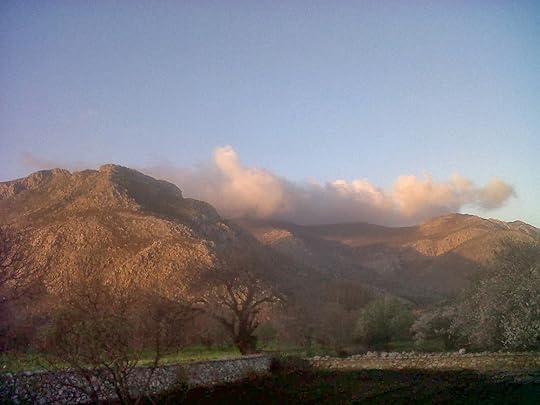
The early morning walk, while ostensibly for Lisa, is becoming an essential part of my day for feeling calm and energised. One morning it turned into an hour of watching the sun come up over the gap in the hills,
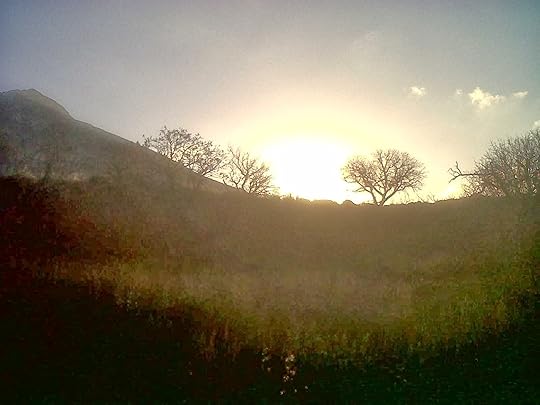
stumbling upon caches of unusual flowers or the smell of a field full of sage; noticing how the sweet almond blossoms are on their way out, white margaritas spilling across the fields, and bright red poppies are on their way in.
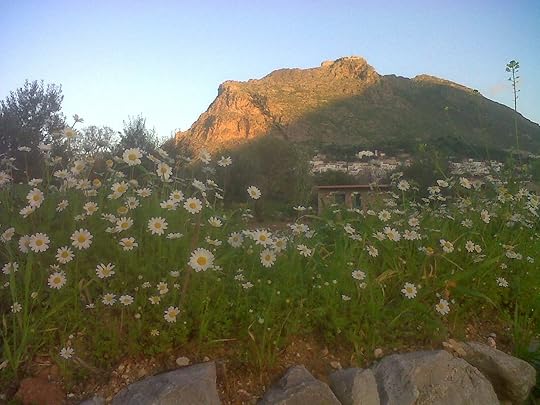
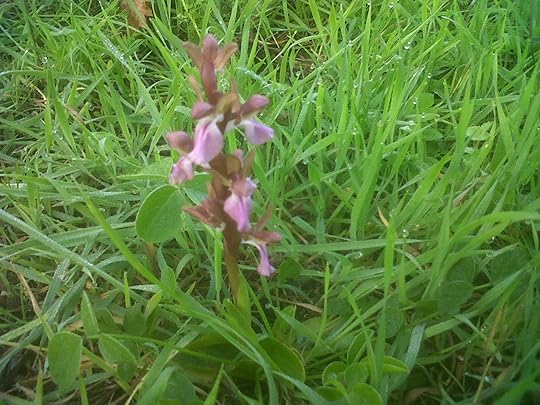
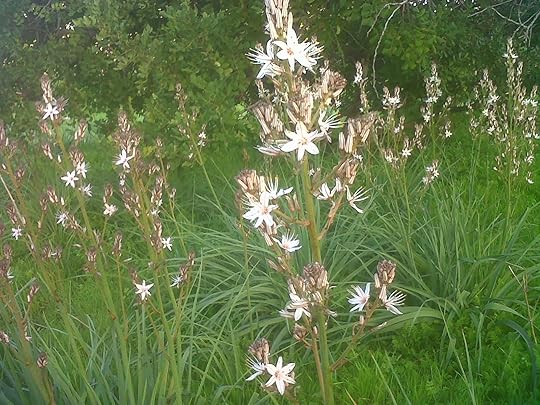
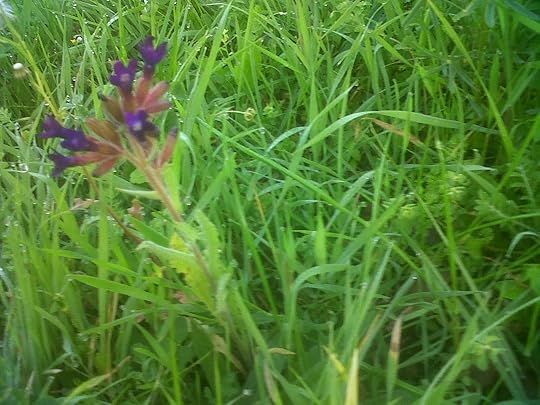
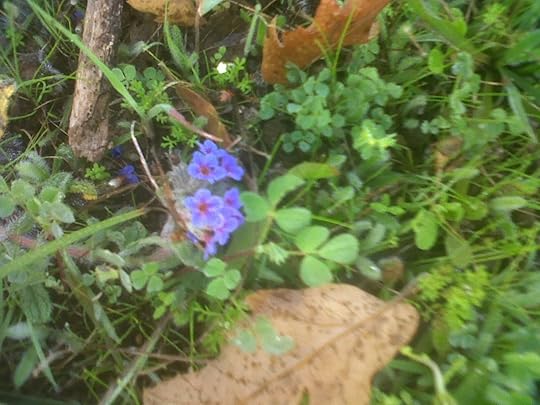
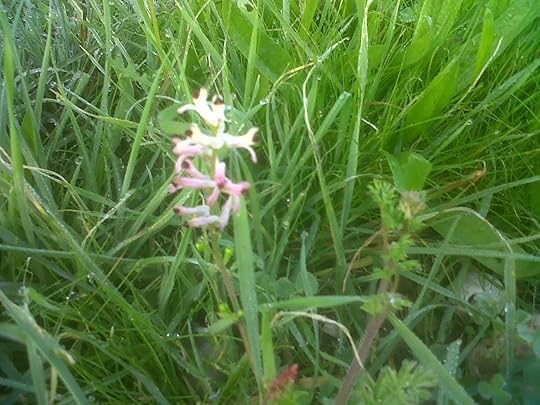
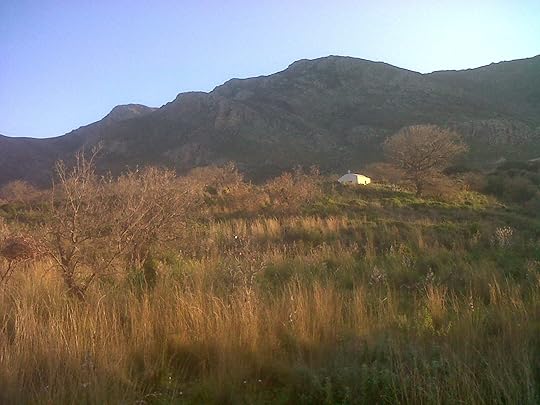
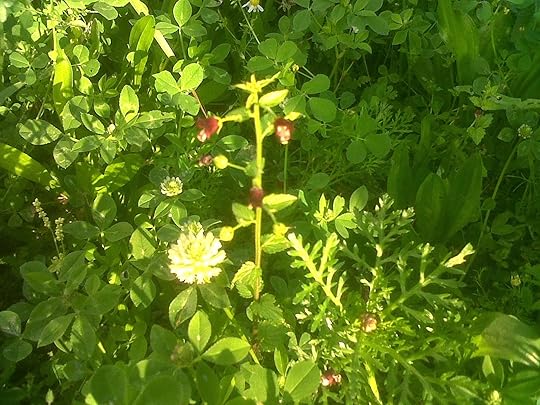
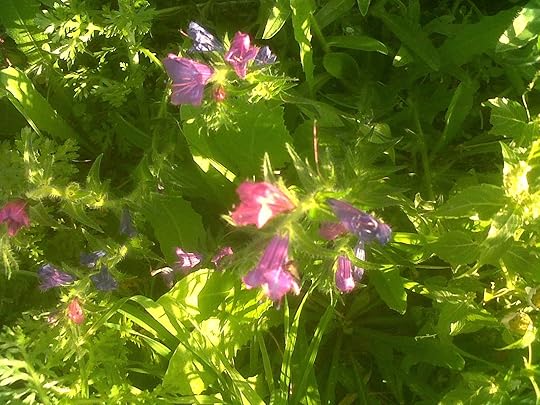
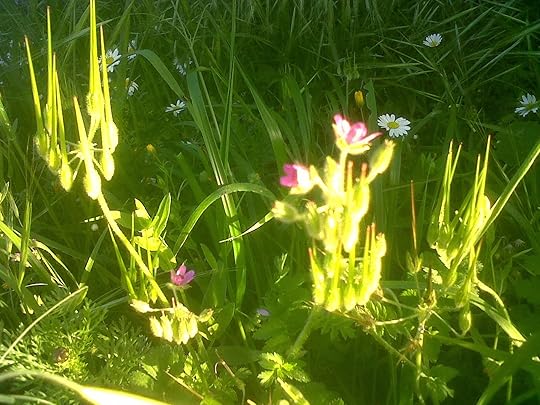
Yesterday was too cool for swimming, but still sunny, so I put on my hiking boots and walked up to the Italian House - top of the highest hill near Megalo Horio.
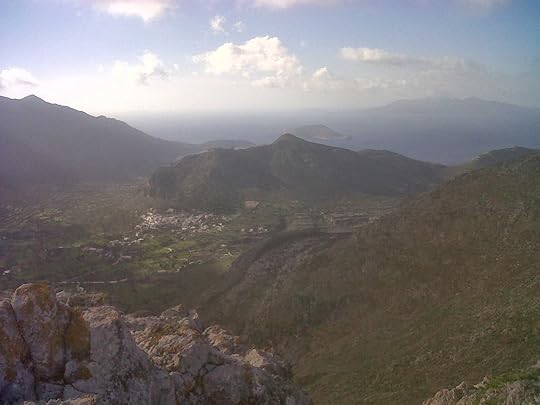 Again, I was astonished by how many different flowers I saw by the path - I wished I had a proper camera with me.
Again, I was astonished by how many different flowers I saw by the path - I wished I had a proper camera with me.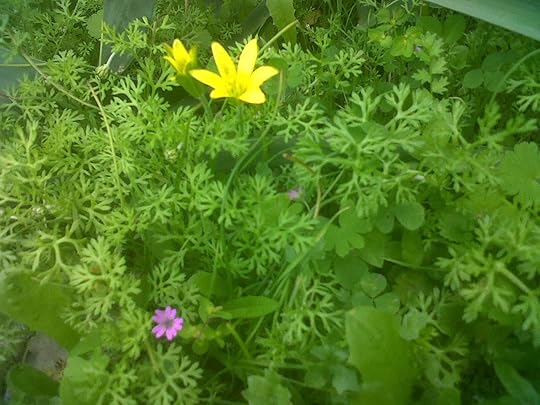
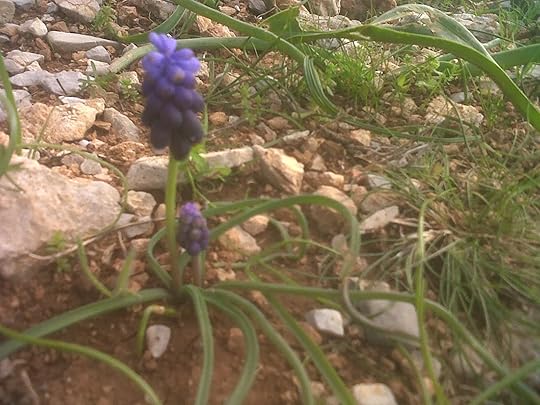
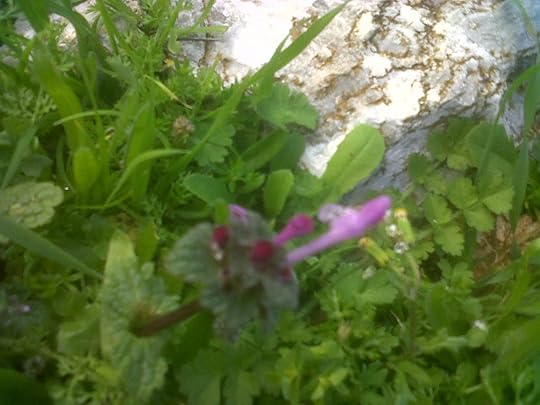
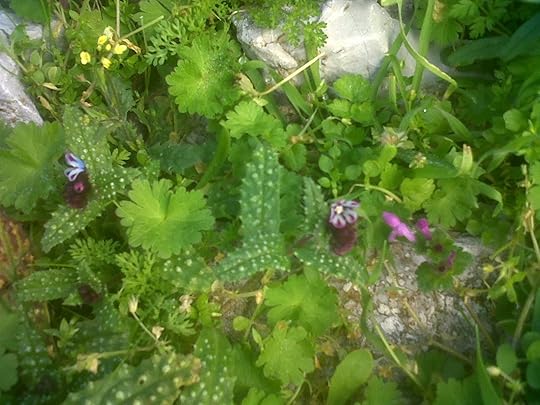
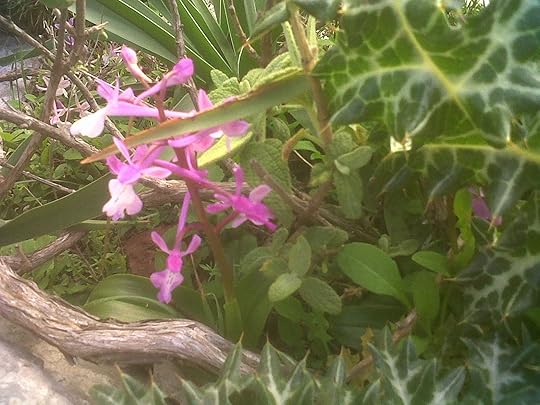
As you know, botanical knowledge is not my forte. 'Tiny purple flowers' is about as specific as I get; our good friend over at When the Wine is Bitter is your man when you need botanical information, but he is now in exile from our shores, in distant Australia. A source informs me, however, that he was seen stuffing a copy of The Wild Flowers of Greece into his backpack as he went. So perhaps he'll be tempted to provide botanical notes from... somewhere near Botany Bay?
Coming back from a morning walk, I happened on a group of men discussing work to be done to the pergola over the road, which has been deteriorating badly (see 'Tilos Life' page). It seemed the time had come for repairs and I was delighted to be there for this momentous occasion.
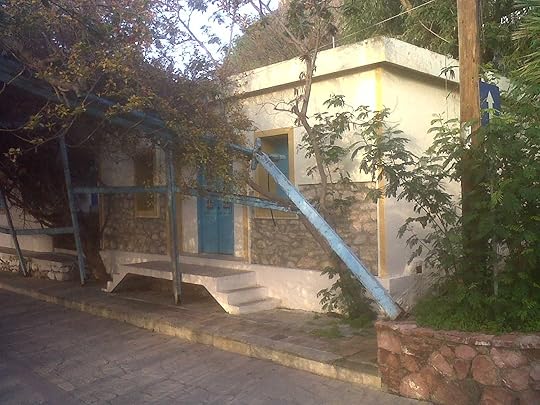 When I went back to check later, it was clear that only emergency measures were being taken, and I have to admit I still felt the need to run quite fast through it. While concrete is being poured liberally over the Skafi side of the village (which now seems like it will be able to cope when Tilos is a Grand Prix destination),
When I went back to check later, it was clear that only emergency measures were being taken, and I have to admit I still felt the need to run quite fast through it. While concrete is being poured liberally over the Skafi side of the village (which now seems like it will be able to cope when Tilos is a Grand Prix destination), 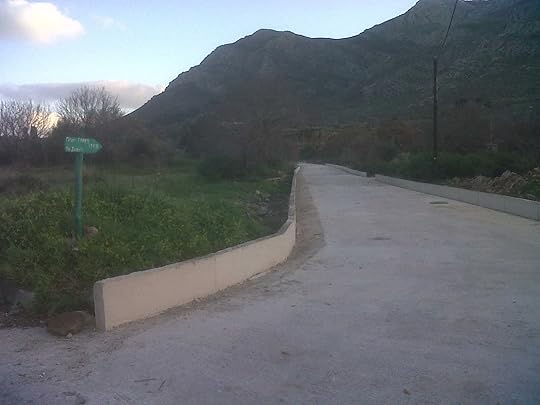 the pergola continues to lean and rot. Those of us who contributed money to the Save the Pergola fund might need our cash back soon, anyway, given that we haven't had a functioning ATM on the island since before Christmas. If you're worried that Tilos might ever really change and become just like the rest of the mediocre world, then honestly - don't. Long live the People's Republic of Tilos.
the pergola continues to lean and rot. Those of us who contributed money to the Save the Pergola fund might need our cash back soon, anyway, given that we haven't had a functioning ATM on the island since before Christmas. If you're worried that Tilos might ever really change and become just like the rest of the mediocre world, then honestly - don't. Long live the People's Republic of Tilos.And so I've had a week of sunny early morning walks, lunchtime swims on deserted beaches, evening dancing - thanks to the traditional dance classes - and even a dinner of souvlaki under the stars and moonlight.
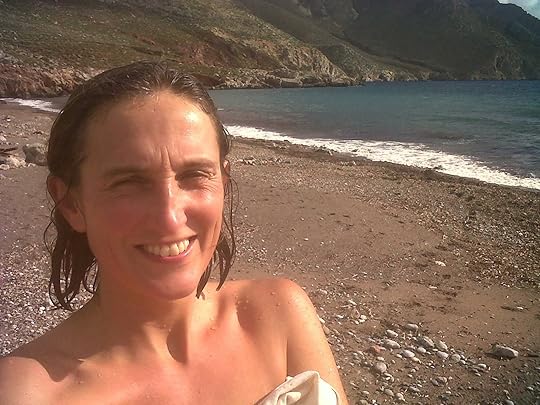
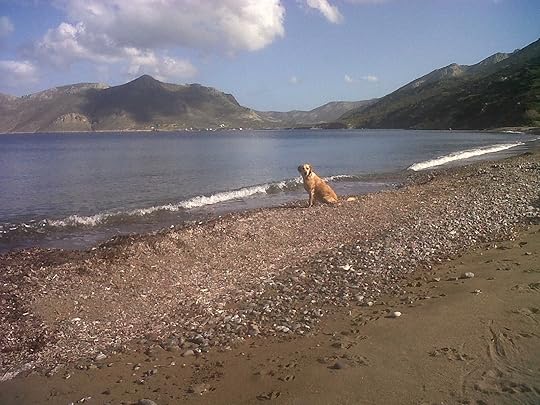
One last thing, because it's Valentine's Day. My friend Gwyn, who plays her flute in Rhodes during the summer (we first met at Stathis Hotel) and spent a few days in Tilos last autumn, is now ready to play at weddings and is just about ready to launch her website, The Wedding Flautist in Rhodes. It's four years since she first performed in Athens on Valentine's Day 2010. Take a look and spread the word...
And in the meantime, love from Tilos x

Published on February 13, 2014 21:55
February 2, 2014
February Colours on a Tiny Greek Island
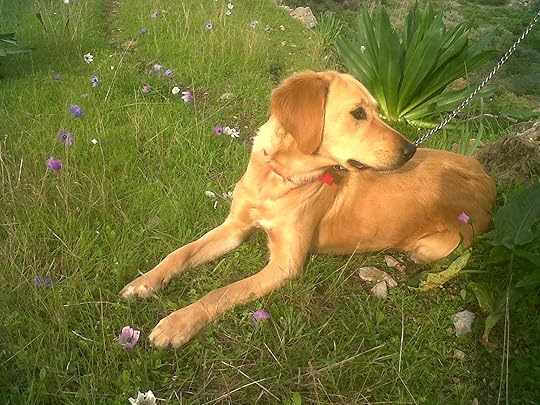 It was cold and grey this morning, not a dash of colour in the sky when I looked out of my office window. Lisa had woken me with enthusiastic licks to the face, but after being walked and fed had gone back to sleep on the couch. Sitting with my cup of tea, I knew the only thing for it was to get outside. We could go somewhere colourful, like the path to Lethra. Lisa leapt up and down as I took her down to the car, then poked her head out the window and into the wind as we drove down to the start of the path.
It was cold and grey this morning, not a dash of colour in the sky when I looked out of my office window. Lisa had woken me with enthusiastic licks to the face, but after being walked and fed had gone back to sleep on the couch. Sitting with my cup of tea, I knew the only thing for it was to get outside. We could go somewhere colourful, like the path to Lethra. Lisa leapt up and down as I took her down to the car, then poked her head out the window and into the wind as we drove down to the start of the path.Owning a dog in Tilos is not as easy as I’d thought, because of the animals roaming free everywhere. Over the winter, the goats and sheep give birth, and Lisa, who loves to chase them, has to be kept on a lead. Even then, I’ve been shouted at regularly in Megalo Horio for taking her anywhere near animals, though she can't do much harm on a lead; and you never know where the animals are going to be. So a trip to a different path felt like a good idea.
Over on our side of the island, to the north, all the fields are covered in anemones these days, and pretty gorgeous they are. But it almost came as a surprise to find, at the entrance to the path to Lethra, such an abundance of cyclamen scattered over the ground, all over the sides of the path and the hillside. By the time we reached the pink rocks around the spring, the colour was back in February and a smile on my face.
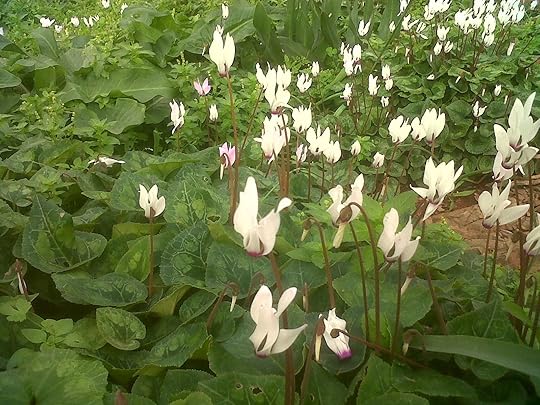
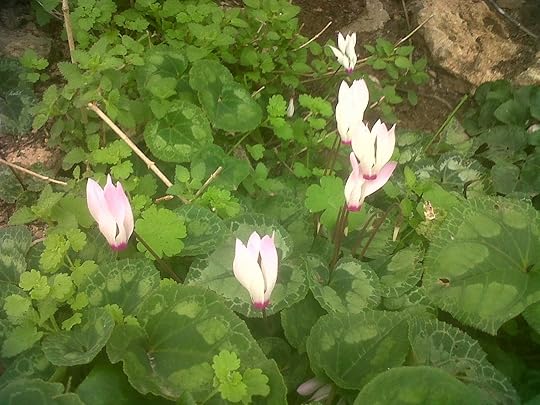
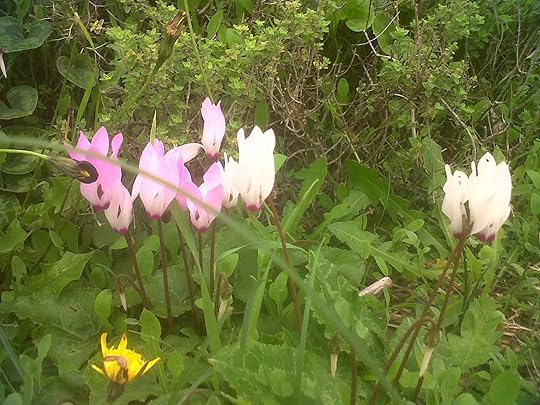
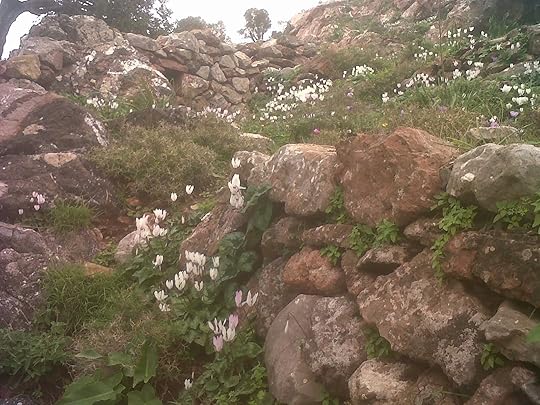
I longed to let Lisa run free, but didn’t dare, and hoped it was good training for her. She’d pull ahead; I’d tell her ‘siga’ and ‘perimeneh’, so she’d stop in the middle of the path, until I inched towards her, when she’d pull ahead again and I’d lose my footing. Mark Twain famously said that golf was a good walk spoiled, but perhaps if he’d ever had to walk an ebullient dog on a lead down a precarious path, he’d have agreed it comes a close second. Lisa would probably comment that anyone who stops to crouch down and point a phone at some flowers every few minutes doesn’t really understand what walks are supposed to be about.
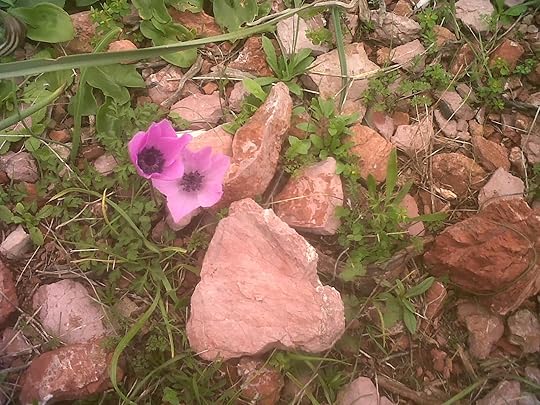

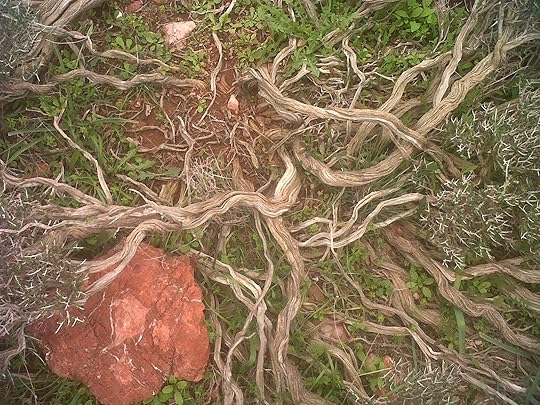
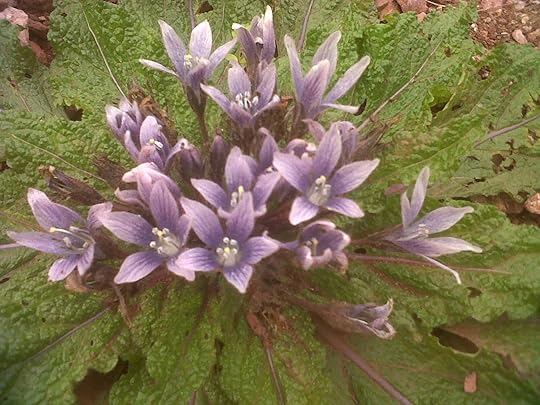 Soon I could hear the waves on the shore at Lethra, and it occurred to me that I hadn’t walked to the red beaches around the promontory for ages, so we took the path that split off to the right. The cyclamen had gone, but the trail was covered in tiny purple flowers. Before long we were scrambling down the hillside towards Ammohosti. I let Lisa off the lead, and she veered to the north side of the promontory instead to end up at the stunningly red cliffs of Merisi beach.
Soon I could hear the waves on the shore at Lethra, and it occurred to me that I hadn’t walked to the red beaches around the promontory for ages, so we took the path that split off to the right. The cyclamen had gone, but the trail was covered in tiny purple flowers. Before long we were scrambling down the hillside towards Ammohosti. I let Lisa off the lead, and she veered to the north side of the promontory instead to end up at the stunningly red cliffs of Merisi beach.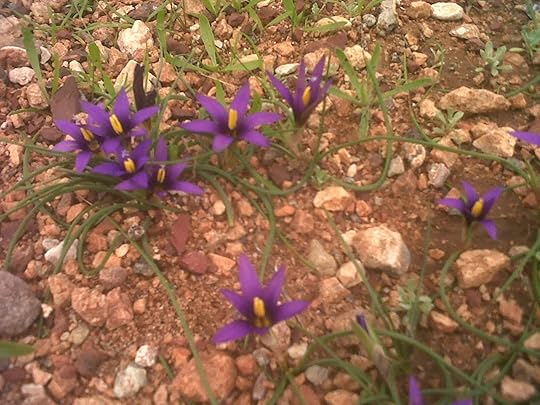
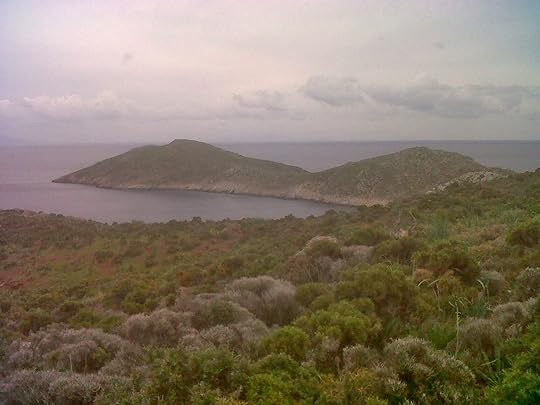

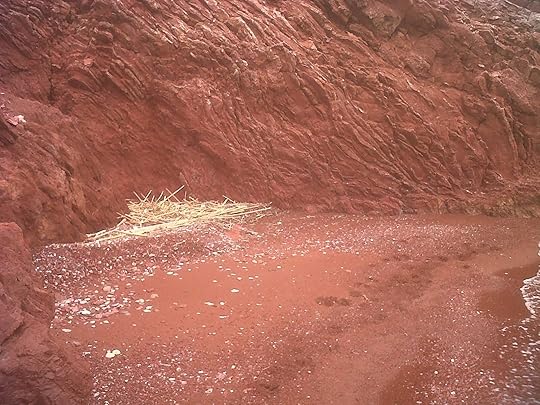
Lisa had been right. This side was sheltered against the wind, and the beach was a deep shade of brick red. Lisa was in the water first, but I was a close second. It was cold, the coldest swim I can remember having in Tilos, but as always it made me feel happily alive. The air felt warm as I got out and dried off, laughing at Lisa as she raced up and down the beach and leapt upon sticks and plastic bottles.
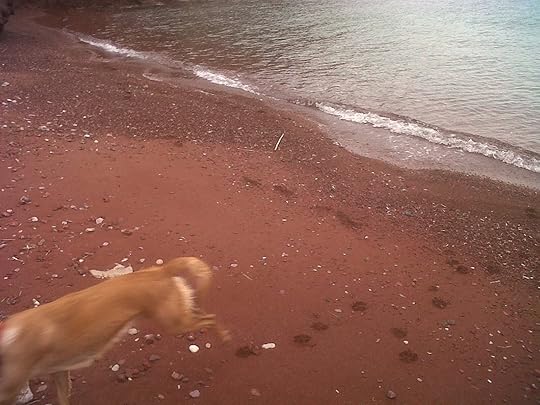
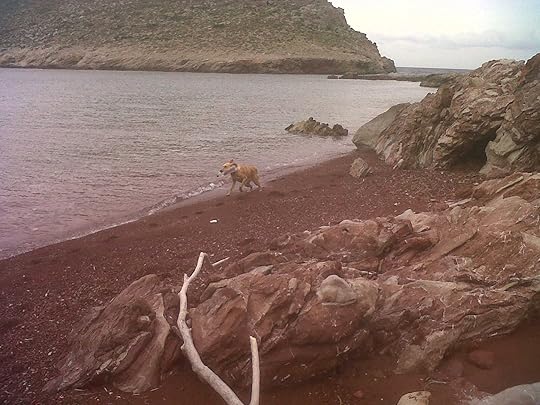
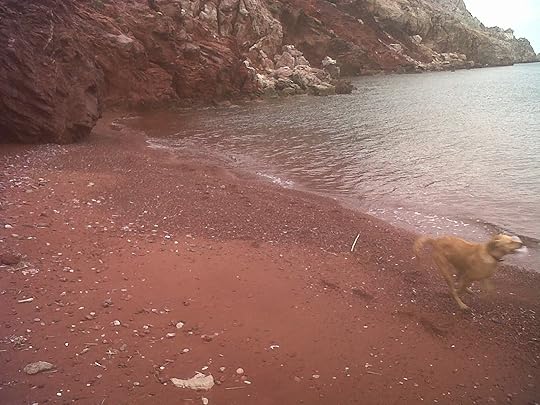
We clambered over the headland a little to the narrow gap between the land and Donkey Island. Almost three years living on this island, and this grey February morning I was seeing it from new angles.

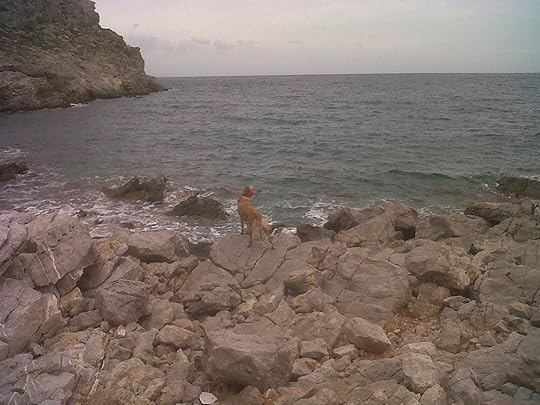
Later, back at the car, I realised it would be a good idea to head into Livadia to buy vegetables and cheese while I was nearby. Lisa always gets terribly excited as we descend to Livadia, but it was a disappointment for her on the whole: hardly a soul about. We picked out what we needed from the supermarket; Pavlos the bus driver was in there complaining about the state of tomatoes at this time of year; I reminded myself not to think about the high cost of food here, having just come back from London and Athens. Lisa was happy outside, being petted by one of the boys from the village.
She’d have liked to stay and chase cats, but Livadia feels forlorn to me out of season. I drove back instead to Megalo Horio, which looks solid and timeless in the winter, clinging to the hillside. We got stuck behind a man trundling along on a scooter, but I didn’t bother overtaking, just slowed down and stroked my faithful hound and looked around me.
Published on February 02, 2014 04:32
January 2, 2014
A Happy, Adventurous 2014!
Lisa was looking glum on the couch. I looked out at the weather. It's been mild as can be for the last few days, but after a flash rainstorm this morning, the power cable for my computer seemed to have burned out; thankfully I had a spare.
The clouds had cleared and it was brighter, so I picked up Lisa's lead, and Lisa jumped up and was at the gate in seconds. I didn't take my phone in case we got caught in a shower. We headed down into Potamia, then up the hill towards Skafi. Every day, more bright flowers - purple and yellow and white - are appearing.
Waving to Menelaus, who was herding his sheep, we made our way past his farm and then down the path, and had almost reached the beach when the rain started. I looked back and saw the sky was full of heavy clouds; we were going to get wet, one way or another.
I made a dash across the rocks, slowed down by Lisa as she stopped to shake the rain off her wet fur every few minutes, and made it into the shelter of the cave. Water dripped down relentlessly in front of us, and the bay grew pale. The rain got more intense and loud as heavy drops hit the sea, the horizon hidden in cloud. Lisa stopped looking for stuff to chew, and stared out with me.
Then ten minutes later, it seemed to be clearing. Sure enough, within minutes the hillsides were bright with sunshine. The horizon was a distinct line, with a half-rainbow appearing above it, and the sea in front of me was clear and blue. I stripped off wellies, two pairs of socks, jumpers... and was at the edge of the water when a great rumble and crack of thunder came from the black clouds over to the south. But to the north was sun. I jumped in, dived into the blue. Lisa chewed a stick and rolled around on the pebbles. My second swim of the new year - or a very fast dip, anyway. It was a good adventure. As we walked back up the hill from Skafi this lunchtime, the wind dried my clothes out, more or less.
This has been my first Christmas and New Year spent in Tilos. Village kids came around to the house on Christmas Eve and New Year's Eve to sing carols, asking 'Tha ta poumeh?' I've learned that Santa comes on New Year's Eve in Greece, not Christmas Eve (well of course, he can't be everywhere at once, can he?). And that while Greeks don't make a big fuss of Christmas, they write exquisitely lovely, thoughtful messages to friends at New Year.
We spent New Year's Eve with three friends and eighteen cats by the sea at Ayios Andonis at the wild north end of Tilos, eating hearty grub around a kitchen table. Stelios kept looking at the clock, as anything after ten seems late to the fisherman, so there was no danger of missing midnight - though we might have otherwise, with no television, no mobile phone reception, no crowds of people round about. We took our champagne glasses out to the end of the harbour, and we looked out for fireworks in Nisyros or Kos or Turkey but didn't see any, and saw the new year in peacefully with thousands of bright stars above, and just the dark hills and water, and one other lone figure outside by the taverna. It was a special way to welcome a new year in.
I just went out now to take Lisa for her evening stroll, and all is so quiet out, I could hear the rough sea at Eristos, and the lightning is still flashing above the hills to the south... I wish you happiness, good friendship and health in 2014; spend time with your loved ones and have lots of adventures in the coming year, and plenty of time in a place you love.
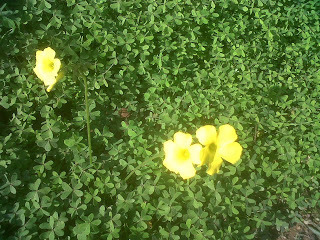
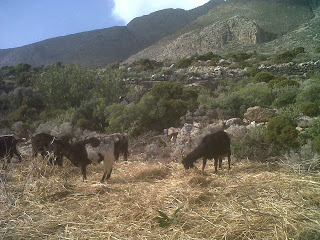
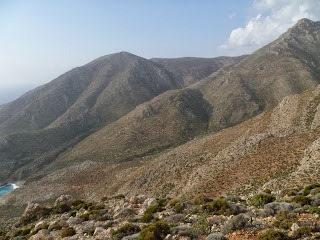
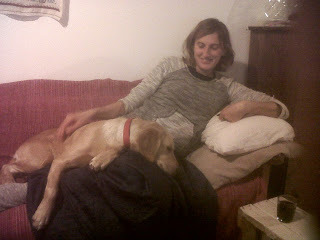
I've been experimenting with a Tilos Calendar using my favourite photos from last year. I haven't got very far with it yet; there are 233 photos in my March file, and I like too many of them. Here are two months, which you are welcome to download and print out... March coming soon, maybe!
January: http://tinyurl.com/pjsssnt
February: http://tinyurl.com/ofvfqhk
The clouds had cleared and it was brighter, so I picked up Lisa's lead, and Lisa jumped up and was at the gate in seconds. I didn't take my phone in case we got caught in a shower. We headed down into Potamia, then up the hill towards Skafi. Every day, more bright flowers - purple and yellow and white - are appearing.
Waving to Menelaus, who was herding his sheep, we made our way past his farm and then down the path, and had almost reached the beach when the rain started. I looked back and saw the sky was full of heavy clouds; we were going to get wet, one way or another.
I made a dash across the rocks, slowed down by Lisa as she stopped to shake the rain off her wet fur every few minutes, and made it into the shelter of the cave. Water dripped down relentlessly in front of us, and the bay grew pale. The rain got more intense and loud as heavy drops hit the sea, the horizon hidden in cloud. Lisa stopped looking for stuff to chew, and stared out with me.
Then ten minutes later, it seemed to be clearing. Sure enough, within minutes the hillsides were bright with sunshine. The horizon was a distinct line, with a half-rainbow appearing above it, and the sea in front of me was clear and blue. I stripped off wellies, two pairs of socks, jumpers... and was at the edge of the water when a great rumble and crack of thunder came from the black clouds over to the south. But to the north was sun. I jumped in, dived into the blue. Lisa chewed a stick and rolled around on the pebbles. My second swim of the new year - or a very fast dip, anyway. It was a good adventure. As we walked back up the hill from Skafi this lunchtime, the wind dried my clothes out, more or less.
This has been my first Christmas and New Year spent in Tilos. Village kids came around to the house on Christmas Eve and New Year's Eve to sing carols, asking 'Tha ta poumeh?' I've learned that Santa comes on New Year's Eve in Greece, not Christmas Eve (well of course, he can't be everywhere at once, can he?). And that while Greeks don't make a big fuss of Christmas, they write exquisitely lovely, thoughtful messages to friends at New Year.
We spent New Year's Eve with three friends and eighteen cats by the sea at Ayios Andonis at the wild north end of Tilos, eating hearty grub around a kitchen table. Stelios kept looking at the clock, as anything after ten seems late to the fisherman, so there was no danger of missing midnight - though we might have otherwise, with no television, no mobile phone reception, no crowds of people round about. We took our champagne glasses out to the end of the harbour, and we looked out for fireworks in Nisyros or Kos or Turkey but didn't see any, and saw the new year in peacefully with thousands of bright stars above, and just the dark hills and water, and one other lone figure outside by the taverna. It was a special way to welcome a new year in.
I just went out now to take Lisa for her evening stroll, and all is so quiet out, I could hear the rough sea at Eristos, and the lightning is still flashing above the hills to the south... I wish you happiness, good friendship and health in 2014; spend time with your loved ones and have lots of adventures in the coming year, and plenty of time in a place you love.




I've been experimenting with a Tilos Calendar using my favourite photos from last year. I haven't got very far with it yet; there are 233 photos in my March file, and I like too many of them. Here are two months, which you are welcome to download and print out... March coming soon, maybe!
January: http://tinyurl.com/pjsssnt
February: http://tinyurl.com/ofvfqhk
Published on January 02, 2014 09:31



